
Yacht Crew Agency / Candidates / Yacht Salaries Guide

Yacht Salaries Guide
Many of our candidates are asking us for advice on what their salary should be on a yacht.
We have prepared a table of approximate wages in the yachting industry. Even though these salaries may give you a reference point, we would like to inform you that all yachts are different, equally as their owners.
These salary rates are based on the current state of the employment market in yachting in 2024. Real wages always vary depending on the candidate’s experience, training, certificates and additional skills.

Different Salaries of Yacht Crew Jobs
People working on a yacht can earn extras.
Tips are another big financial reward for the team of the superyacht to be rewarded. Specially operating on a charter yacht gives crew a great chance to earn extra money, but how much is expected? It is up to it. Common tips vary from 5% to 20% of the charter cost, sharing about 10% and split by all crewmembers.
Living on a private yacht cannot provide all such advice, but it has its own crew benefits, including greater rest, longer vacations, rewards and also the prospect of the owner’s unexpected donations. Such proprietors are often considered to tip.
Different Position in a Yacht Crew, Different Salary
Without a doubt, each position has a different monthly income. So the higher position you will get the higher salary you will get. Here are an overview about some positions on a yacht.
The Captain must be skilled and trained in maritime affairs, outstanding navigational knowledge, exceptional administration, coordination, strategy and diplomacy. A Superyacht Captain will have outstanding nautical expertise, repairs, electronics, professional procedures and accounting, Finance and administrative records knowledge. A captain must have a cool, charismatic demeanor and must be exceptionally competent to work with men, staff and visitors. Average monthly salary : 60ft (18m) à 2,200€ – 3,700€
During the captain’s absence, the Chief Officer / First Mate will have the captain’s good management and interpersonal abilities and outstanding experience and procedures in ISM and ISPS. The CEO will be someone with a solid history in deck work from prior practice with Deckhand or Boson. Average monthly salary : 60ft < 75ft (23m) à 2,200€ – 3,000€
Under the command and control of the commander, the chief steward must perform his or her duties. The head chef may therefore train and prescribe some lower level stews under his command, as the sole responsible for the interior of the vessel and for offering a satisfactory hospitality service to fulfill the holidaymakers ‘needs. Excellent support, networking and management are a must, as is an innovative environment. Average monthly salary : 100ft (33m) – 140ft (43m) à 2,200€ – 3,000€ +
Morgan & Mallet Yacht Crew Agency helps all yachting professionals find the best job and create a career in yachting
By clicking “Accept All Cookies”, you agree to the storing of cookies on your device to enhance site navigation, analyze site usage, and assist in our marketing efforts.
Hire and Find Experienced Yacht Crew staff
This form is for employers who are looking to hire staff only.
You want to talk to a recruiter to help you personalise your recruitment. Choose a date from the list of available appointments and let us guide you.
Click one of our contacts below to chat on WhatsApp

Social Chat is free, download and try it now here!
Insert/edit link
Enter the destination URL
Or link to existing content

Yacht Crew Salaries: Complete Guide to What Yacht Crew Earn
It’s no secret that the impressive yacht crew salaries attract most people into the exclusive yachting world.
Junior deckhands or stewardesses can earn starting salaries of $3000 per month. With a few years of experience and some courses to back you up, this amount moves up towards $4000-$4500 per month!
In order to compile this superyacht crew salary guideline, I have taken 10 of the top yachting platforms and used all of their data, combined with my personal experience, to reach an average salary expectation for each position.
Table of Contents
How Much do you Make Working on a Yacht?

Yacht Captain Salary
- 20m-30m: $4000-$7500
- 30m-40m: $5500-$9500
- 40m-50m: $8000-$15000
- 50m-70m: $13000-$19000
- 70m+: $16500+
Requirements of a Yacht Captain
- Years of experience needed: 3-5 years of experience as Chief Officer/Mate and more than 5 years of experience as a Captain for larger yachts
- Minimum level of Qualification: 200ton licence which allows you to drive vessels below 200tons
The Captain has the highest level of responsibility onboard the yacht and hence they earn the most out of all the yacht crew salaries.
Captains are accountable for the overall safety of the yacht, crew members and guests.
They also handle daily operations of the yacht, guests, and owner liaison. They deal with management companies, port control, budgets, human resources, and many more tasks and logistics that make the job demanding and stressful.
On top of this, Captains are required to hold high levels of certifications depending on the size of the yacht they are driving.
Yacht Captain salaries can sky rocket with higher levels of qualifications.
If you are looking to become a Yacht Captain one day I recommend looking into the courses required so you can get started with licenses and sea time. It takes time to get there, but when you do it will be worth it.

Chief Officer Yacht Salary
- 30m-40m: $4000-$6000
- 40m-50m: $4500-$7500
- 50m-70m: $5500-$9000
- 70m+: $8000+
Requirements of a Chief Officer
- Years of experience needed: 3-5 Years
- Minimum level of qualification: Officer of the Watch
The Chief Officer is second in command to the Captain and is responsible for carrying out the Captain’s standing orders.
On smaller yachts, the Chief Officer is referred to as the Mate.
The Chief Officer is responsible for carrying out the safety duties onboard and assisting in the bridge with paperwork and navigational planning.
The Chief Officer is also responsible for leading and managing their deck team, ensuring crew are following their duties as well as managing the water sports and guest activities.
The salary of a Chief Officer depends heavily on the license held.

Bosun Yacht Salary
- Years of experience needed: 2-3 years
- Minimum level of qualification: Yacht Master Offshore
- A yacht Bosun salary can vary between $4000 and $6000.
Responsibilities of a Bosun
The Bosun is essentially the Lead Deckhand onboard. A lead deckhand salary on a larger vessel will be similar to that of a bosun salary on a smaller vessel.
This is an opportunity to step up from being a deckhand and gain some experience in a leadership role. This position is in place for larger yachts so that when the Officer is busy with bridge duties, someone is in charge on deck.

Yacht Deckhand Salary
Years of experience needed: 0
- Minimum level of qualification: None needed, however Power Boat Level 2 and Yacht Master offshore will put you at a great advantage
- Entry-level yacht crew salaries start at $3000 and can go as high as $4000/$4500.
Responsibilities of a Deckhand
A Deckhand is an entry-level role on a yacht.
You need to spend a few years (or less) as a Deckhand in order to learn and gain experience so that you can step up in the ranks and obtain your licenses.
This role will be very hands-on in maintaining the exterior of the yacht. Duties will include cleaning, polishing, varnishing, sanding, caulking, and any other maintenance work required.
Chief Steward / Chief Stewardess Salary
- 30m-40m :$4500-$5500
- 40m-50m :$5000-$7000
- 50m-70m- $5500-$8000
- 70m+: $7500+
Responsibilities of a Chief Stewardess/Steward
- Years of experience needed: 3-5 years
- Minimum level of qualification: Depending on the size of the vessel you may need courses such as Food Hygiene and Safety, Silver Service, WSET, or a Purser course
The Chief Stewardess or Steward is responsible for all the interior operations of the yacht .
They are responsible for managing the interior team, and ensuring the interior of the yacht is maintained to the highest standards. Besides cleaning and laundry schedules , this also includes provisioning for crew and guests, budgeting, accounting, and training of junior crew.

Steward or Stewardess Yacht Salary
- Minimum level of qualification: Depending on the size of the vessel you may need courses such as Food Hygiene and Safety and Silver Service
- Salaries start at $3000 and go up to $6000
Responsibilities of a Steward or Stewardess
A Stewardess/Steward is an entry-level position working within the interior of the yacht.
There are rankings within the interior (2nd, 3rd, 4th Steward/Stewardesses). As you spend more time in the industry, you will be promoted to higher ranks, and with that will come a better salary and more responsibility.
This role covers a range of tasks, including but not limited to housekeeping, laundry, bartending, table scaping, floral arrangements, serving, and hosting guests.

Engineer Yacht Salary
- 20m-30m: $4000-$5000
- 30m-40m: $4500-$6500
- 40m-50m: $6000-$8000
- 50m-70m: $7500-$11000
- 70m+: $9000+
Requirements of an Engineer
- Years of experience needed: 2-4 years in an engineering role onboard as Deck/Engineer or relevant land-based experience
- Minimum level of qualification: AEC
The Engineer onboard is responsible for all mechanical functioning and maintenance of the vessel. This is a very technical role that can pay well as you gain experience and obtain your licensing.
Yacht Chef Salary
- 20m-30m: $4000 – $5000
- 40m-50m: $5500 – $75000
- 50m-70m: $6500-$9500
Requirements of a Yacht Chef
- Years of experience needed: 3-5 years depending on previous experience
- Minimum level of qualification: Food Hygiene and Safety Level 2
The Chef is responsible for feeding the crew 2 to 3 healthy and sustainable meals a day. They are of course required to prepare meals for guests when onboard to the highest of standards.
In their day-to-day tasks, they will be responsible for their own provisioning of the galley, maintaining stocks, cleanliness, and hygiene of the galley.
The salary of the Yacht Chef varies depending on qualifications and experience.

Yacht Crew Salaries for Private vs Charter Yachts
There are two types of super yachts that require crew: Private and Charter yachts. The salaries for yacht crew differ slightly between the two.
Private Yacht
A private boat is owned by a single person or family who uses the yacht for their own purposes. They don’t charter it out and you can expect to have the same guests onboard for the duration of your contract.
The benefit of these programs is that you get to know your guests well so you may find it easier to manage their wants and needs.
You may also benefit from traveling to off-the-beaten-track locations as I have!
For yacht crew working on these private boats, you will usually not receive charter tips.
Charter Yacht
A charter boat is one that gets chartered out by guests. This operates as a business and also means you will have different guests for every trip.
If you work on a charter boat you can expect to receive charter tips at the end of each charter. These are usually 10%-20% of the charter fee!
Considering these tips can be anywhere from $2000-$5000 per week depending on the size of the yacht, charter boats offer great earning potential and can skyrocket your salary as a yachtie.

Hi, my name is Lisa, a Chief Stewardess in the yachting industry with 10 years of experience, as well as 8 years of hospitality experience prior to that. Being in the yachting industry has been a whirlwind of adventure, growth, challenges and some of the best experiences of my life, and I am excited to share my knowledge and experiences with all of you.
How to Write the Perfect Yacht CV [With Template]
A day in the life of a yacht stewardess.

Yacht Crew Salaries By Position
Ever wondered what staff members aboard a luxury yacht charter make? Here’s a breakdown by position. Some may surprise you.
If you have ever binge-watched Below Deck, or daydreamed about working on a luxury yacht, you may have thought to yourself, “I wonder what they make?”. Many people across the world have jumped at the opportunity to rub elbows with the world’s elite while working aboard the most luxurious ships in the world.
If you have wondered what the salaries are for workers on a yacht, and want to take the next step toward a great mix of freedom and pay, joining a luxury yacht crew might be for you.
Crew jobs on yachts can be some of the most rewarding careers available, but they are also challenging. It is important to know what to expect when applying for a crew job. Here is a breakdown of what you can expect to find when applying for a yacht crew job.
Yacht Staff Departments
To understand the yacht crew job descriptions better, you have to understand the different departments in a yacht. These departments include:
- Deck – passage delivery, safety, outdoor guest activities, and exterior maintenance.
- Interior – guest wellbeing, housekeeping, accounting, activities.
- Engineering – smooth running of the yacht and safety.
- Galley – stock control, hygiene, food preparation, galley maintenance.
On any yacht, the captain is at the top of the hierarchy. They are responsible for reporting to the vessel’s owner via a representative or directly. Below are the job descriptions for yacht crew members in these departments.
Salaries will vary depending on the size, type, location, and use of the yacht. The crew’s experience and qualifications will also play a role in determining their salary.
Deck Department Roles
The captain’s job description includes: keeping the vessel safe and secure, ensuring that all crew members are doing their job, and reporting any safety concerns. Typically, this person will also be in charge of hiring other deck officers for specific duties. Depending on various factors, the captain could be paid $4,200 to $15,800 per month.
Although this an extremely high pay rate, it requires decades of experience typically. Being in charge of the safety of passengers, crew members and potentially a $50 million yacht is serious business!
Chief Officer/First Mate
Chief officers’ responsibilities include supervising the crew’s daily activities, maintaining duties and duties lists, and overseeing crew pay. This is also the person who will be in charge of hiring other crew members and managing the activities or watersports the guests would like to participate in. Typically, this person will make around $3,100 to $14,200 per month.
Second Mate
The second mate’s job description includes: being in charge of navigating the yacht and overseeing any repairs that may be needed. Typically, this person will make around $3,100 to $8,400 per month.
The third mate’s responsibilities include: handling deck chores and maintenance for the yacht. The salary is $2,600 to $6,300 monthly.
A bosun is in charge of safety and security, supervising diving operations and monitoring all deck equipment. They will also maintain the diving records whenever necessary. This person will make around $2,600 to $6,300 monthly.
Interior Department
A purser is responsible for hiring, training, and caring for all crew members. They are sent out to find candidates and supervise their performance in port and during sea trips. They are responsible for every operation in this department. Typical salaries go from $5,200 to $9,400 monthly.
Chief Steward
The chief steward is responsible for hiring, training, and supervising all crew members in the interior department. They will set up work schedules, determine pay scales and enforce penalties if they are not followed. Typical salaries go from $4,800 to $8,800 monthly.
The steward is in charge of the kitchen, taking orders and keeping track of all supplies. They unpack and pack the guest’s luggage and remain on standby at all times in case anything happens. Salaries go from $3,100 to $6,800 monthly.
Engineering Positions
Chief engineer.
He or she is in charge of the engine room and is responsible for ensuring it is operating smoothly. The chief engineer is responsible for providing services to all the other positions on board if needed. They will make around $6,300 to $15,600 monthly.
Second Engineer
As the second in command to the chief engineer, this person will be in charge of all engine room duties and services that need to be done. Salaries are typically around $3,200 to $10,500 per month.
ETO Officer
An ETO officer will oversee all electrical and electronic equipment, including everything from the GPS to the yacht’s peripheral devices, lighting, and communications equipment.
They will be in charge of setting up the systems, testing them during repairs, checking their functionality, and identifying any problems. Salaries are around $4,300 to $8,500 monthly.
Galley Positions
The head chef is in charge of all the food preparation and storage. All food preparation is under the direction of this chef. They are trained professionals who ensure that strict hygiene standards and food safety are maintained. Salaries go from $6,300 to $10,500 monthly.
The sous chef is in charge of food preparation and operations and preparing all menus at the direction of the head chef. They prepare, cook, and serve all food items that the guests require while on board. Salaries go from $3,700 to $8,400 monthly.
Galley Staff
There is a galley staff who works in the galley. Galley staff will be responsible for washing dishes, cooking, cleaning, serving food, and preparing daily menus. Salaries go from $2,500 to $4,300 monthly.
The Bottom Line
This article covers the yacht crew job descriptions for various jobs on the yacht and their salaries. As you plan to secure a job in the yacht crew industry, ensure you know everything you need to about the job. What will be the working hours? Will there be leaves to travel home? You must be prepared before applying for any of these jobs on a yacht charter .
One thing to note is that some ormost of these positions aren’t available on all yacht charters. This will depend on a number of factors including the numbere of guests, size of the yacht, budget of the guests and location of the yacht.
Being a member of a yacht crew is both flexible and very strict at the same time. Your level of service and professionalism are critical to ensuring the esteemed guests have an experience they expect for shelling out tens of thousands of dollars. So, expect very strict rules while on board.
To learn even more about renting a yacht in San Diego, please visit our articles page!
Working On Yachts
There are currently over 15,000 yachts in the world large enough to require professional, qualified yacht crew and as a result this industry is growing rapidly each year.
A career in yachting can be rewarding, exciting and a wonderful opportunity to travel the world and explore new horizons!
Wherever there is water, you have the potential to go. Traditionally the yachting industry in the Mediterranean runs from April until September and from November to April in the States & Caribbean. Having said that, the possibilities are endless with many yachts circumnavigating the world.
Yachting is an eye opening, ultimately fun industry that demands hard work, perfection and attention to detail. We work with yacht crew every day and have a deep insight into what new crew should do to make the most of their career. Here are our top ten tips for starting out.
You cannot work on board a luxury yacht without getting your basic qualifications first. Bluewater offers a full range of crew training courses for those just starting in the industry:
- STCW 95 Basic Training 5 Day Course
- Powerboat Level II 2 Day Course
- Interior Introduction 3 Day Course
- AEC 1 5 Day Course
We have a sample copy and lots of relevant advice on creating your first yachting CV within our 'Your CV' section.
Certain times of year are more favourable for new crew looking to join the industry. If you are going to Antibes or Palma, we advise end of March/April. Fort Lauderdale is different in that it is sunny most of the year, however there is a peak recruitment season around November each year.
In every yachting hub you will find english speaking bars and cafes filled with yacht crew. Make sure you go and explore to build your network within yachting. Although global, it is a small industry so make sure to present yourself professionally.
Finding your first position in yachting is the hardest. Make sure you are dock walking, looking for day work opportunities and handing out your CV. You may find that one day's work leads to a permanent role or other job interviews.
Read websites, follow yachting news, learn from other crew who were in your 'deck shoes' a few years ago. Good examples of yachting websites & magazines are:
- Bluewater bluewateryachting.com
- Dockwalk dockwalk.com
- The Crew Report thecrewreport.com
- The Triton thetriton.com
Apply for jobs, manage your course bookings and sign up for events.
You can buy pay as you go SIM cards either in newsagents or specialised telephone shops around the Mediterranean. This will help to save you money when job hunting!
Captains check Facebook and Twitter pages before interviews. Make sure any public images of you are professional and will not reduce your chances of employment. Once employed be sure to avoid any posts about your yachts, current location and inappropriate images.
A smart, professional appearance will win over shorts and a beach top.
The most important aspect when you are looking for work is to make sure your CV is up to date, well written and includes any relevant experience that you might have.
It is best to emphasize any hospitality experience or customer service skills you may have had, such as waitressing, hostessing, silver service, bartending, cooking, nanny/au-pairing, babysitting, flower arranging, cleaning and/or laundry experience.
Should you wish to join the engineering department, make sure you include all mechanical experience and qualifications, including all work done in refrigeration, air conditioning, work with engines, and any electrical work, electronics or AV/IT.
The most important aspect to include is any recreational sailing experience you may have had. If you are also qualified or experienced in woodwork or carpentry, have painting, polishing, varnishing know-how, then that is also great. In addition any diving, sailing, fishing, any water sports background are all fantastic skills that are easily transferable.
We deal with a great multitude of chef positions, ranging from crew chef to head chef. Most positions will require some form of culinary training, however some crew succeed in entering this department through the stew/cook route on a smaller yacht.
When filling in your online profile with us, make sure to only select positions that you are qualified to do onboard. Selecting more than 3-4 positions on your profile can confuse potential employers and effect our search results.
Your CV should be no more than two sides of A4, including your photograph (in colour, face on, without sunglasses).
Your CV should be in a word format to ensure it can be opened easily by all employers.
List all recent contact information, references and work history.
Including a personal statement, along with a clear objective can help distinguish you from other candidates and helps prospective employers grasp your long term goals.
Don't give employers an excuse to dismiss your CV, review and spell check it!
Salary Guidelines

Knowledge is power and the more you research, the more informed & on the ball you will be.
Make sure you have a printed copy of your CV with you and always arrive early and dressed in a smart way. Research the yacht, make yourself prepared & don't be afraid to ask questions.
The key to getting your first job is to network! Always carry a copy of your CV with you.
Remember the industry is a tight, professional network therefore it is crucial to communicate with others, walk the docks, distribute your CV and register with crew agencies. Bluewater is one of the longest-established crew agents - we have been finding people yacht jobs since 1991!
Keep the agencies up to date! Always make sure your profile has the correct location and contact numbers for you so we can get hold of you when we have the perfect role for you.
Your profile is essential to us finding you work, both now and in the future. We rely on the information you input to match you to the right jobs, so please make sure it is up to date and at least 85% complete. We receive thousands of vacancies each year, and search our database for the best candidates for each one... You will hear from us more often if you are checking in regularly! Once you find work you can set your profile to 'Not Available'.
- Yachting for beginners
- Owning a yacht
- Motor Yachts
- Sailing Yacht
- Indian Ocean
- Mediterranean
- Buying or Selling a Yacht
- Yachting Events
- FAQ – Luxury Yacht Charter
- FAQ – Buying a Yacht
- FAQ – Sell your Yacht
- How Much Does It Cost To Charter A Luxury Yacht?
- All our Blog Post & News

Yacht crew positions : Hierarchy, Missions & Salaries explained
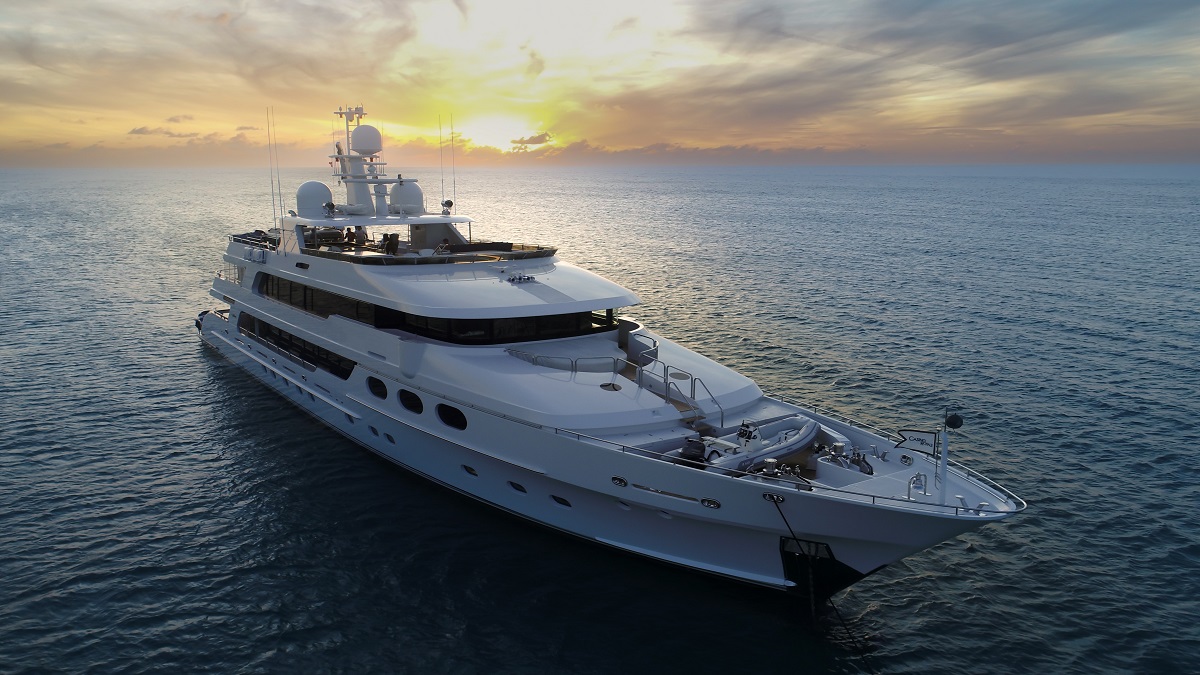
Like any well-run hotel, restaurant, or other luxury service, a crewed yacht needs organized structure and good management. Whether you’re staffing your own luxury vessel or looking for an exciting career working and traveling the world, you need to know how this structure works, and what you can expect to pay or earn and do in the various roles on board.
Every yacht is a little different, and organization may reflect the style of the captain or the demands of the owner. But the same jobs need to be done on almost every boat. Organized with ranks, heads of each division report to the Captain. It’s not a military-style organization, but there are parallels with merchant marine grades and structures.
Smaller yachts need fewer crew, and staff may wear multiple hats that cross more traditional divisions and may combine some jobs with others. Large yachts have more distinct divisions or subdivisions, with more specialization to divide tasks and manage staffing. The core skills are the same, but finding staff with the right blends to do the jobs is key. Crew with broader skills are highly sought after.
As a yacht owner, you shouldn’t have to worry about day-to-day management decisions or organizing all this. That’s why you have a captain, and it’s better to leave staffing decisions entirely up to him or her. But it’s still important to know what it is people you’re hiring do, why they’re there, and how many you need. You don’t want too many crew, or to be short-handed. An understanding of what your yacht needs helps you talk to the captain to keep your yacht running how you want it.
For those looking to break into yacht crew work, consider your skills and strengths, and what jobs appeal to you. You’ll need training before you work, and you can direct your job path through the training you seek. Your goal is a suitable position on a well-run yacht, so make yourself the most attractive candidate possible.
Yacht Work Life
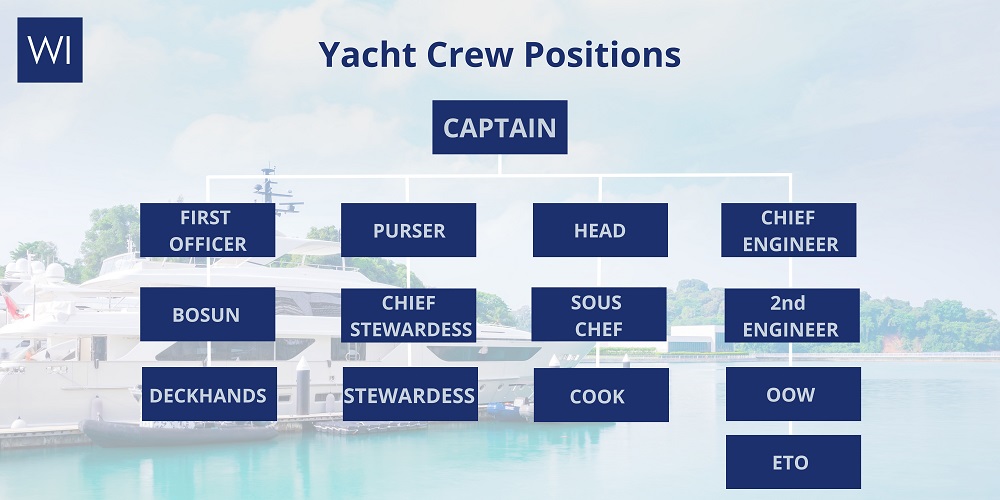
Working on a yacht is also living on the yacht. Crew must have a space to sleep, food, and all the basics that any employee needs. Large yachts have space reserved for crew, and owners looking for quality crew should provide good working and living conditions. Your crew takes care of you, and you should take care of them.
Depending on where a yacht operates or what flag she flies, a variety of labor laws or rules may be in effect. These requirements may be for work visas, contracts and written agreements, and compliance with merchant and ship crew treaties and laws. Be prepared to have work and non-disclosure agreements between yacht and crew, though a few yachts skip this.
Seasonal Jobs
Many yacht positions are seasonal. Year-round employment is more likely for senior crew like the captain and department heads, but not all yachts see year-round use. And some yachts may use different crew in different locales between seasonal moves.
Any job listing should give seasonal information, with geographic information, the length of the season, and the prospects for year-round positions and repeat employment.
Hours, Salaries, and Expectations
Yacht crew is a service job at its core, and every yacht owner is looking for service-oriented people who understand how to deliver a hotel-quality living and restaurant-quality fine dining. Work experience in luxury hotels and restaurants is a big plus for some jobs, and makes breaking into yacht work easier.
Yacht work can be very demanding, with periods of intense work when the owner and guests or a charter party is on board. Long days aren’t uncommon, but often balance with slack time when the boat is empty of passengers. There is always work to be done, but there’s usually a chance for time off.
Most salaries are monthly, since many positions are seasonal. Pay ranges are commensurate with experience, rank, and responsibility. Private vessels usually offer higher base pay, as charter crew can earn tips on top of their base salary. Because of the demands of the lifestyle, compensation is good and you have minimal living expenses on board.
Benefits and Time Off
Because so many jobs are seasonal and may occur in different countries and locations, benefits offered to yacht crew vary widely. But it is not uncommon for crew to be offered health and accident insurance and a flight to the vessel. Living on board, you’ll get food, rooming (usually shared), basic toiletries, uniforms, and laundry. Yachts with a longer view may offer additional training to long-term prospects.
Time off is usually linked to boat use, and may be sporadic in-season or when the boat has the owner and guests on board. There will always be some time off, but it may be between very intense work periods.
Most crew jobs have an employment contract that meets the Maritime Labour Convention 2006 (MLC). This should spell out the contract period and duration, as well as salary, leave and time off, probationary periods, repatriation policies, and any other crucial details to meet the minimum international standards of crew welfare.
This contract should also contain shipboard policies on confidentiality and non-disclosures, drug and alcohol use on board, personal hygiene expectations, interpersonal relationships, and dispute resolution. Job expectations and requirements can also be included, with specific language about roles, tasks, and cooperation between divisions.
Note that all crew agreements will explicitly prohibit drug use on board, most limit alcohol consumption and ban hard liquor on board, and many boats have policies prohibiting intimate personal crew relationships. Because the crew is living on board full time and in close quarters, rules to maintain decorum and crew harmony may be in writing.
Training & Certificates
Two key certifications are required for yacht crew. Employers look for the STCW (Standards of Training, Certification and Watch-keeping for Seafarers) and the ENG1 (Seafarer Medical Certificate). Insurers generally require crew to have these two certifications or the equivalent.
The ENG1 isn’t a class. It’s a medical exam to ensure that the crew is physically fit to serve at sea and has no underlying conditions that may arise far from help. It’s best for prospective crew to secure the ENG1 before investing more time and money training.
STCW is a week-long class on the basics of onboard safety. This includes hands-on modules covering personal survival, fire safety, first aid and CPR, accident prevention, and security awareness. It needs to be refreshed every five years.
Shared, Hybrid, and Crossover Jobs
Larger vessels will have more defined duties and specific areas of responsibility. But smaller yachts may want the crew to have different roles in different situations. For example, a hybrid job description may read “3rd Engineer/Steward” and describe a role in engineering when the boat is empty but on inside crew when passengers are on board.
When hiring or seeking jobs be prepared to look for creative crossover skill sets to meet the needs of the vessel.
Extra Skills and Duties
Any extra skills outside the regular duties makes crew more attractive. From stewards who can teach yoga, give massages or play cocktail piano to deck crew who know how to water ski, SCUBA dive, or fish, anything that crew can bring to enhance the passenger experience adds value to the employee.
If you’re looking for a position, list the skills you’d be comfortable using. If a vessel owner is looking for something specific, spell it out and figure out how that special duty fits into the employee work day.
The Four Main Divisions

Most yacht crews break into four primary divisions which group related tasks and responsibilities together. While the grouping sounds like it’s by section of the boat, they’re really more functional. For example, stewards (Interior) will definitely serve meals, whether they’re in the main dining room or out on deck. Deckhands (deck) are going to be involved in painting, sanding, and varnish jobs anywhere on the boat.
The deck crew handles most of the exterior operations of the yacht, and runs it. Deck hands and crew keep the boat looking clean and shiny, and handling most vessel operations. This includes driving and operating the yacht, navigation, running all launches and ship’s craft, handling lines, and all maintenance and painting, washing, and shining.
2-Interior (or Inside)
Inside crew are primarily the stewards and housekeepers. Larger vessels will have a dedicated housekeeping staff separate from the stewards, but smaller vessels may not.
Stewards keep the interior clean, do all housekeeping, laundry, food and beverage service, cabin preparation, and anything else needed for the comfort of the passengers.
3-Engineering
Below decks, the engineering department ensures the safe and smooth running of all the ship’s machinery and electronics. Engineers are engine and systems specialists, and there will usually be a dedicated electronics expert. Most engineer jobs require professional training and certification.
Fine dining is a hallmark of the yachting experience, and a full-time galley crew prepares all meals for passengers and crew. The head chef plans the menus and provisions the boat, while junior chefs assist the head chef with meal preparation and keeping the galley spotless.
Yacht Job and Department Details
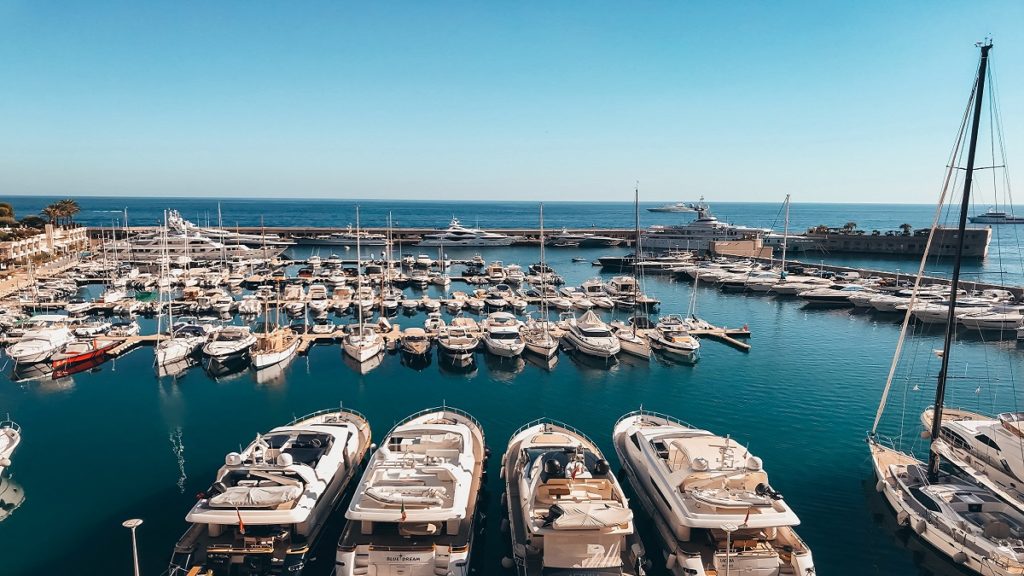
Departments are all organized in a hierarchy, with a department head reporting to the Captain. The clear chain of command makes for smooth operations, with all communications going up and down ranks. Junior staff will occasionally take instructions from other divisions as all crew is expected to help as needed. A captain or department head may organize staff differently, so reporting structures listed are guidelines only.
All salary ranges are monthly figures and are ranges based on yacht size and crew experience. Senior jobs on larger yachts have more responsibility than the same job title on yachts with smaller crews. Experienced crew are very desirable and can expect more pay for their positions.
Listed responsibilities are not exhaustive, and different yachts may allocate some jobs to different positions.
Read also: The yacht charter experience ladder
The Captain

The captain of the vessel is the overall decision maker for the yacht in all situations, including the safety of the vessel. The owner should leave the Captain responsible for operational decisions about hiring and staff and operating the ship. To become a captain requires years of experience and training, and a broad set of skills including yacht operations, personnel management, budgeting and finance. The captain works directly with the owner and owner’s representative, if the captain is not also acting as the representative.
On an organization chart, the Captain is usually placed in the deck division, but the Captain is always the senior-most crew on the yacht and all division heads report to the Captain.
Responsibilities include:
- Responsible for all navigation and running the yacht.
- Senior decision maker on all crew hiring.
- Manage repairs, refits, and yard work.
- Manage budgets and accounting. On larger yachts, this task ends more on the Purser, but the captain is always responsible.
- Ensure all paperwork, clearances, and legal requirements are completed.
- Primary contact with the owner or charter parties.
Reports to: The yacht owner
Salary Range: $6,000 to $22,000
The deckhands handle all the outside responsibilities of the ship, including cleaning and maintenance of the yacht and all the ship’s vessels and toys on board. Deck crew will have significant contact with passengers in this role, operating launches and delivering guests to and from shore and handling the toys.
All deck crew have watch responsibilities on passage, and daily responsibilities keeping the yacht pristine and clean. They will also do line handling and secure the yacht.
Deck department : Chief Mate/First Officer
The Chief Mate or First Officer is the second in command of the vessel, and left in charge when the Captain is not on board. The first mate has the requisite skills to stand in for the captain and run the yacht if needed and usually acts as the division head of the deck team.
The seamanship skills needed are similar to the Captain’s position.
- Primary safety officer for the yacht and all passengers and crew.
- Supervise and manage all operations on deck.
- Bridge watches on passage.
- Passage planning and navigation.
There may be additional mates on larger vessels, these 2nd, 3rd, etc. mates have similar responsibilities on rotation. But the first mate is senior and always second in command.
Reports to: Captain
Salary Range: $4,000 to $9,500 (First mate)
Second and more junior mates may earn $2,000 to $4,000
Deck department : Bosun
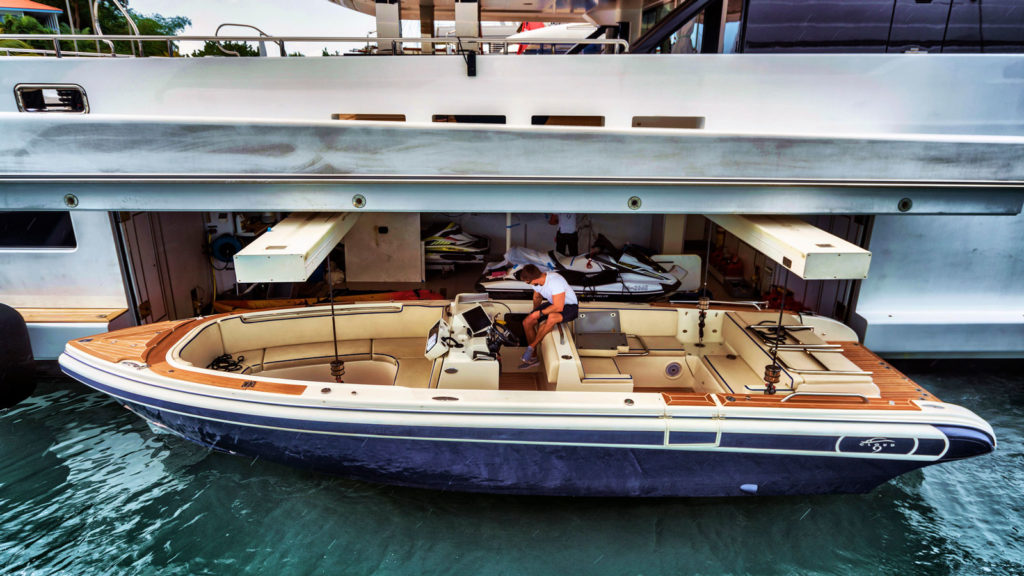
The Bosun is the senior deckhand and manages the junior hands on board. This will usually be the most experienced hand on board.
- Organizing all operations on deck.
- Coordinating the use, storing and launching of the ship’s boats, toys, and equipment.
- Managing the passerelle, watching passenger safety.
- Contact point for guest service on boats, toys, and trips to shore.
Reports to: First mate
Salary Range: $3,000 to $5,000
Deck department : Deckhands
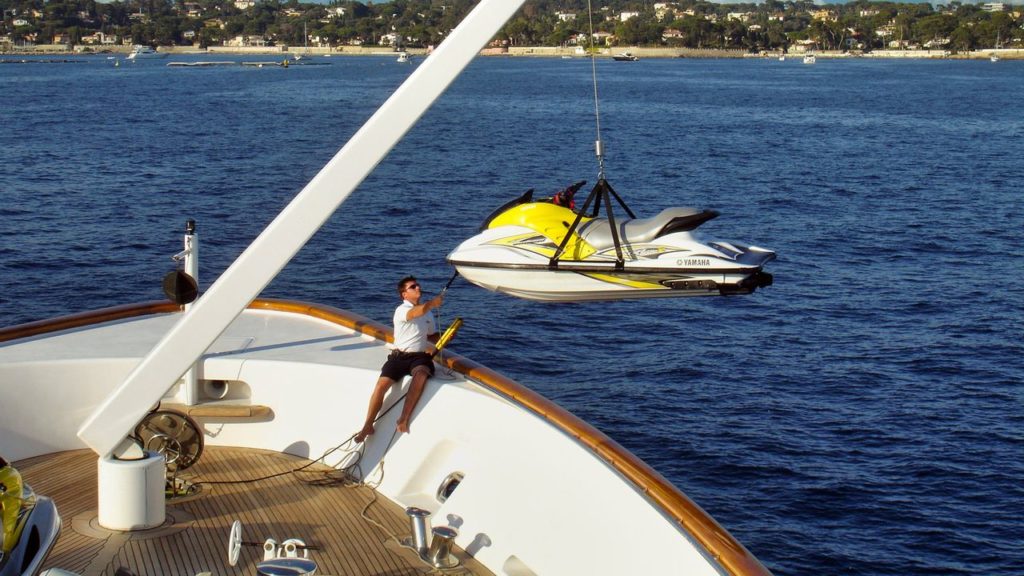
Deckhands are constantly busy with maintenance, cleaning, polishing, and assisting guests as needed. They will assist other departments as needed or given special duties.
- Daily cleaning of the yacht’s exterior.
- Painting, varnishing, polishing.
- Line handling.
- Launching and operating dinghies and tenders.
- Repairs and carpentry.
- Helping guests as needed – everything from handling baggage and gear to embarking and disembarking.
Reports to: Bosun
Salary range: $1,300 to $3,000
Though every position on a yacht is service-oriented, the interior or inside crew provides the primary customer service. They will interact the most with the passengers daily, and they’re directly responsible for the quality of their experience on board.
Interior department : the Purser
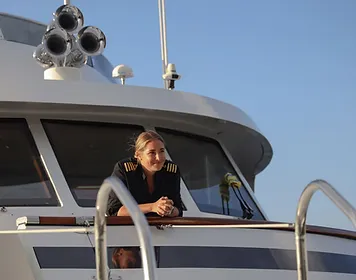
The purser is the chief financial officer of the yacht and handles all the financial operations on board. Accounting, purchasing, payroll and hiring, and all money matters end up with the Purser. This is a senior staff position, and may be the interior department head. Smaller yachts may eliminate the purser’s job and add it to the captain’s and other senior staff duties.
Responsibilities Include:
- Accounting and bookkeeping for all financial transactions.
- Human resources and payroll.
- Handling logistics for all departments related to purchasing.
- Managing contracts.
- Event coordination, including off yacht bookings and payments.
- Primary administration of the boat’s business paperwork.
- Inventory and supply management.
Salary Range: $4,000 to $8,000
Interior department : The Chief Steward/ess

The chief steward or stewardess has primary responsibility for all service roles inside. Food and drink service, cabin preparation, and anything to do with helping the passengers be more comfortable and enjoy their stay. The chief steward will be inside crew with several years of experience.
The chief steward manages the interior staff, setting and enforcing vessel service standards. The chief steward ensures the crew delivers a five-star hospitality experience.
Chief Steward Responsibilities:
- Scheduling and training junior crew for meal and drink service and cabin preparation.
- Primary contact with guests for meals and drinks.
- Sommelier and wine service.
- Coordinate with the galley for meals and presentation.
- Decorate the interior, from flower arrangement to table settings.
- Arrange onshore activities and outings.
Reports to: Captain or Purser, depending on the yacht
Salary Range: $4,000 to $8,500
Stewards/Stewardesses
The stewards and stewardesses are the primary guest service staff. They will work closely with guests and passengers, and have daily contact with them as they meet most of their needs while on board.
Steward Responsibilities:
- Food and drink service.
- Room preparation and turndown service.
- Cleaning, polishing, housekeeping, and inside maintenance.
- Cabin detailing.
- Laundry, pressing, and folding.
- Help with outings, trips, debarkations.
Reports to: Chief Steward
Salary Range: $1,500 to $4,500
Housekeeping

Larger yachts may have a dedicated housekeeping and laundry staff. This will be part of the inside crew, under either the purser or the head steward. There may be a senior housekeeper, if there are more than one housekeeping crew on board.
Responsibilities are the cleaning and laundry portions of the steward’s job, and a laundry steward may spend most of her time inside the ship’s laundry.
An experienced Head of Housekeeping may earn from $4,500 to $7,000, while a Laundry Steward typically earns from $2,500 to $3,500.
Read also: CAN OWNING A YACHT TO CHARTER (REALLY) BE PROFITABLE?
Food service requirements on any yacht are high. Whether it’s a privately owned vessel or a charter, the expectations are always for top tier food service, with a variety of meals planned for the requirements of every passenger. Chefs and cooks prepare all meals on board for passengers and crew, but sometimes other interior crew may help with prep work or cleanup.
Smaller yachts have smaller galley crews, but the largest vessels may have an executive chef and several sous chefs. All chef positions require formal culinary training and experience, but cook positions are often entry level. Promotion from cook to chef is unusual without additional training.
Galley department : the Head / Executive Chef

On larger yachts, an Executive Chef will run the entire galley with the help of sous chefs and cooks. With an Executive Chef, there’s an expectation that the food and menus will be on a level with Michelin star-rated restaurants.
The executive chef brings a thorough understanding of food preparation and presentation, and moves food preparation past creative up to artistic. Job responsibilities are similar to a chef, but the job demands and the required experience and education are much higher.
Salary range: $7,000 to $11,000
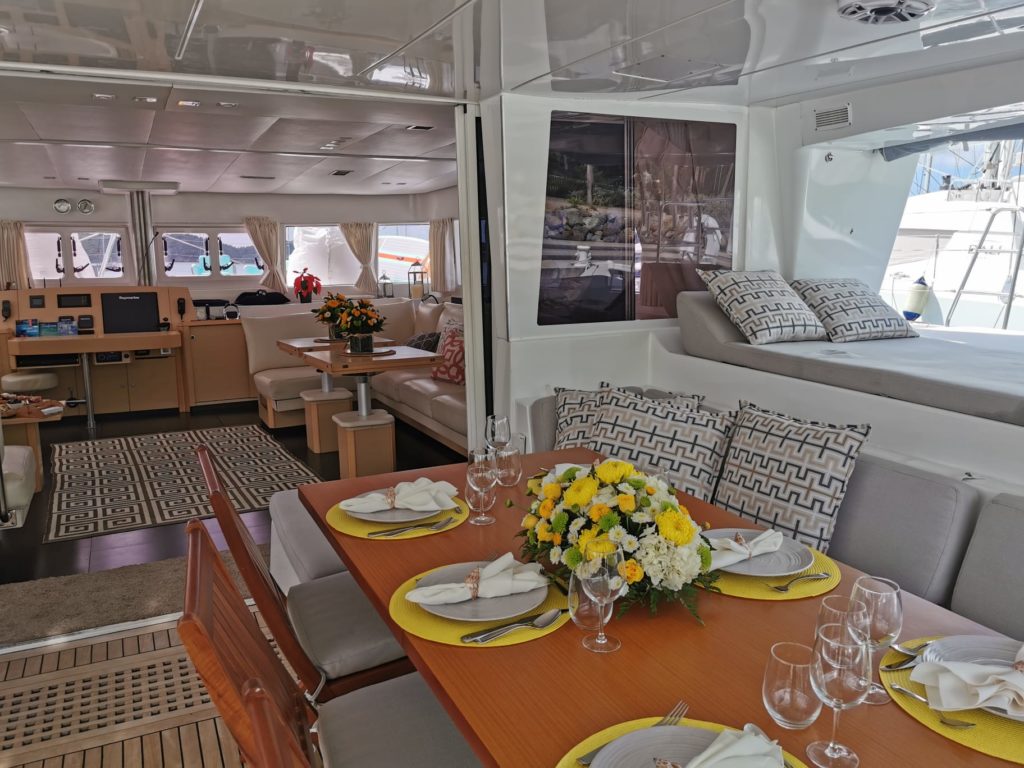
The chef has overall responsibility for all meals on the yacht, from provisioning in remote places to hygiene and good safety. If there’s only one chef, she’s the head of the galley crew. Finding the best provisions in far away locations and making the best of local food availability is a major part of the job.
- Planning a delicious and varied menu for passengers.
- Sourcing all food and arranging transport to the yacht.
- Maintaining and operating within the galley budget.
- Preparing passenger meals with professional presentation and style.
- Cleaning and maintaining galley and galley equipment.
- Deliver menus and meals on time, while running an organized and spotless galley.
Galley department : Sous Chef
The sous chefs assist the chef in all aspects of running the galley, and may have independent assignments to plan and guest and crew meals. While not primarily responsible for provisioning, the sous chef will help with food selection, menu preparation, and planning. A sous chef must have formal culinary training.
Reports to: Head chef
Salary Range: $3,500 – $6,000.

Galley department : The Cook
Cooks may be entry-level positions or experienced, but do not require formal gastronomy education. They will assist the chef and sous chefs, cooking meals and dishes for guests and crew, helping with provisioning, and keeping the galley neat.
- Assist with provisioning and buying high-quality food from local sources.
- Follow all food handling and safety guidelines.
- Assist the head chef as needed, taking direction and guidance.
- Prepare guest and crew meals as required.
- Staying on top of galley inventories and supplies.
Salary Range: $2,500 to $3,500
Engineering

The engineering department keeps the yacht and all its systems working. Whether it’s the engines, electronics, air conditioning, or the plumbing – it’s up to engineering to keep it running.
There is considerable overlap with commercial shipping in the engineering field, as many of the same skills apply. And there is a broader range of qualifications and grades based on the size and power of the vessel. Job ratings may be set by required experience based on tonnage of ship or power of engines, with corresponding levels of pay and responsibility.
Unlike commercial shipping, engineers may get involved in other aspects of running the yacht, like helping with docking and water sports with mechanical toys.
Engineering certifications, training, ratings, experience and licensing are critical to hiring competent engineers, and for engineering crew it’s an important facet of career advancement. This is important for Chief and 2nd Engineers, which are often broken out by MCA (U.K. Maritime and Coastguard Agency) rating or other international equivalent.
MCA ratings for engineers Commercial and Private Yachts over 24m are:
Y4: Less than 200 Gross Tons and less than 1,500 kW engine power Y3: Less than 500 GT and 3,000 kW Y2: Less than 3,000 GT and 3,000 kW Y1: Less than 3,000 GT and 9,000 kW
There is also an unlimited rating for merchant vessels larger than the Y1 category. For discussing salary and responsibilities, we will include all ratings in one position description, but pay scales with the size of the yacht and any required higher ratings.
Chief Engineer
The chief engineer manages all aspects of keeping the yacht and its systems running. The chief engineer manages all the engineering staff, and directs all maintenance, repairs, troubleshooting and upgrades. This is a management position, but requires extensive hands-on technical experience and knowledge. Chief engineers on large yachts hold an MCA Y1 or Y2, smaller boats will have a lower rated chief and a smaller staff. Check Jooble.org to find abroad marine engineer vacancies.
- Provisioning, shopping, and stocking.
- Preparing passenger and crew meals.
- Following instructions and cooking under the direction of others.
- Galley cleaning.
- Follow food safety and storage procedures.
- Food pre-preparation.
Salary Range: $6,000 to $15,000
2nd Engineer
The second engineer is also a highly skilled position requiring a rating or license and several years of experience. This senior level engineer also needs knowledge of how to troubleshoot and maintain all yacht systems.
- Maintain and manage all engineering operations.
- Hire, train and supervise all engineers.
- Project manage all upgrades and retrofits, including managing budgets, contracts, and suppliers.
- Coordinate maintenance schedule for the entire yacht around the usage and seasonal schedules.
- Maintain costs and accounting for engineering operations.
- Design and handle all safety operations.
- Set and maintain standards for operations and cleanliness in the engine room.
Reports to: Chief engineer
Salary Range: $5,500 – $10,000
OOW (Officer of the Watch) Engineer
The OOW is a junior engineering position, but still licensed. There are two categories of OOW – MEOL (Marine Engine Operator License) and the more junior AEC (Assistant Engine Course). The overall responsibilities are similar, working to support the senior engineers and handle independent assignments. The AEC rating is entry level for licensed crew, but has training and certification.
- Support the chief in all projects.
- Maintain a clean, safe engine room.
- Perform all maintenance, troubleshooting and repair tasks as needed.
- Support motorized water sports.
- Occasionally assist with other vessel operations, like line handling.
Reports to: Chief Engineer
Salary Range, MEOL: $4,500 to $6,000 Salary Range, AEC: $2,500 to $3,500
Electronics/Technology Officer (ETO)
The ETO takes responsibility for all audio-visual and information technology on board. Ensuring passengers have access to the internet, movies, television, and music is a primary responsibility. This position carries a fair amount of passenger interaction, and an ETO needs good troubleshooting skills to go with customer service skills.
- Ensure all audio/visual and entertainment systems are always available for passengers.
- Assist passengers with personal technology and ship systems as needed.
- Conduct regular maintenance and upgrades of the network, information, and A/V systems around passenger schedules.
- Assist other engineers as needed, especially with electronic systems.
- Contribute as needed with other departments for boat and passenger operations.
Salary Range: $4,000 to $9,000
Junior Engineer
This is a lower or entry level position for someone with engineering skills but without formal licensing or certification. The junior engineer will help with safety and cleanliness, and assist in any engineering tasks as needed. The ability to solve problems and fix things opens this spot for anyone capable and willing to do the job.
- Help with cleaning, maintenance, and safety functions.
- Help anywhere needed on the yacht.
- Assist senior engineers as needed, taking direction and following instructions exactly.
- Constantly develop skills.
Read also: IS BUYING A BOAT A BAD IDEA?
Whether you are a yacht owner or considering entering this dynamic industry with an established and reliable crew, it is essential to have an understanding of the yacht’s hierarchical structure, mission priorities, and salary expectations. By doing your research on the complexity of yachting before hiring your team, you can confidently select the right group of experienced and qualified professionals for your needs. Staying up-to-date on top industry trends and knowing the capabilities of each type of yacht crew position will enable you to make sound decisions that support a safe and cost-effective journey. With quality personnel at your helm, you can cruise unhindered in luxury and explore new destinations with peace of mind.
Fractional Yacht Ownership : Everything you Need to Know
What is the best country to register your yacht offshore, you might also like.

What differentiates a yacht from a superyacht or a mega yacht?
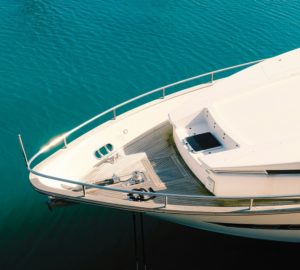
Chartering Requirements and Regulations: A Guide for Boat Owners

What are the Fastest Cruising Catamaran on the Market?

Yacht Crew Positions and Salaries
The organisational structure onboard a superyacht follows a strong hierarchy based upon a military model. Exact job duties and lines of authority are set and strictly adhered to. This hierarchy is followed on the vast majority of yachts; however, responsibilities of the crew on smaller yachts are often merged.
There are four departments on yachts with clear organisational structure:
- Deck (including Bridge) – Safety, passage delivery, maintenance of the yacht's exterior, guest outdoor activities
- Engineering – Safety and smooth operational running of the yacht
- Interior – Housekeeping, guest wellbeing, activities, accounting
- Galley – Food preparation, stock control, hygiene, galley maintenance
The top of the hierarchy on each yacht is the Captain , who reports to the yacht owner either directly, or through a representative or a yacht management company.
Salaries vary and depend on the yacht size, use, type and location, as well as the experience and qualification of the crew member. We included typical salaries of crew based on the data available from reputable industry sources, as well as our research of over 60,000 crew registered with us.
Deck Positions
The primary duty of the Captain is the overall safe manning and operation of the yacht. Yacht Captain is responsible for the vessel, yacht crew, owner and guests, including personnel management, shipyard/project management, legal and regulatory compliance, accounting, achieving owners' objectives, and answers to the owner regarding all decisions.
| Captain | €4,000 - €15,000 |
First Mate / Chief Officer
The First Mate or Chief Officer is the right hand of the Captain. Takes command of the yacht from Captain when required. Shares Captain's responsibilities as required.
| Chief Officer | €3,000 - €13,500 |
| 2nd Officer | €3,000 - €8,000 |
| 3rd Officer | €2,500 - €6,000 |
| Security Officer | €3,000 - €5,000 |
Bosun / Lead Deckhand
Bosuns are usually experienced Deckhands with additional responsibilities. They are in charge of Deckhands onboard the yacht and often spend a lot of time with guests during outdoor activities. The Bosun is normally the main tender driver.
| Mate | €2,500 - €6,000 |
| Bosun | €2,500 - €5,500 |
| Lead Deckhand | €2,500 - €5,000 |
Responsible for the maintenance of the exterior of the yacht and keeping it in pristine condition at all times. Deckhands also assist in maintaining, cleaning and operating yacht's tenders.
| Junior Deckhand | €2,000 - €3,000 |
| Carpenter | €3,000 - €4,000 |
Engineering Positions
Chief engineer.
Responsible for the Engineering Department and for all technical aspects of the boat and its equipment. The Chief Engineer's duties include overseeing all mechanical and electrical operations, ensuring all planned maintenance takes place and liaising with subcontractors.
| Chief Engineer | €5,000 - €15,000 |
Second / Third Engineer
The Second and Third Engineers report directly to the Chief Engineer. They assist in maintaining all mechanical and electrical operations of the yacht.
| 2nd Engineer | €3,000 - €10,000 |
| 3rd Engineer | €2,500 - €6,500 |
| Sole Engineer | €3,500 - €12,000 |
| Motorman | €2,500 - €4,000 |
ETO / AV/IT Officer
Electro-Technical Officer (ETO) and AV/IT Officer are in charge of daily maintenance of all electronic, computer, audio/visual and communications equipment and their efficient operation. This includes the radio, radar, telephones, satellite communications, navigation systems, computers, Internet connection, interior equipment (TVs, sound systems), etc.
| ETO | €4,000 - €8,000 |
| AV/IT Officer | €4,000 - €7,000 |
Electrician
The Electrician is responsible for maintenance of all electrical circuits onboard the vessel, circuit breakers, switches, lighting, batteries, etc.
| Electrician | €4,000 - €6,500 |
This is an administrative position on large yachts. The Purser is responsible for all operations in the interior department, including inventory, purchasing, provisioning, accounting, organising guest activities, and assisting the Captain with the yachts paperwork.
| Purser | €5,000 - €9,000 |
Chief Steward(ess)
Duties are similar to those of other Steward(ess)es onboard the boat, but on a more senior level, including managing the interior department and training. Small yachts with less crew do not have a Purser. The Chief Steward(ess) is in charge of all the responsibilities normally carried out by the Purser on large yachts.
| Chief Steward(ess) | €4,500 - €8,500 |
| Interior Manager | €4,000 - €8,000 |
| Head of Servicer | €4,000 - €7,000 |
| Head Housekeeper | €3,000 - €5,500 |
| Spa Manager | €3,500 - €5,500 |
Steward(ess)
Steward's or Stewardess's main responsibility is to maintain the interior of the yacht and provide the highest standard of care to the owner and guests. They serve food and drinks, prepare guest activities, pack and unpack luggage and are on call for anything that the guests want anytime day or night. On some yachts, they help the deck crew moor the yacht.
| 2nd Steward(ess) | €3,000 - €6,500 |
| 3rd Steward(ess) | €2,500 - €4,000 |
| Spa Steward(ess) | €3,000 - €4,000 |
| Service Steward(ess) | €2,500 - €5,000 |
| Housekeeping Steward(ess) | €2,500 - €4,000 |
| Laundry Steward(ess) | €2,500 - €4,000 |
| Sole Steward(ess) | €3,000 - €6,000 |
| Junior Steward(ess) | €2,000 - €3,500 |
| Butler | €3,500 - €6,000 |
| Stew/Deck | €2,500 - €4,000 |
The Head/Executive Chef onboard a luxury superyacht is a culinary trained professional responsible for the overall management of the galley department on larger yachts, including guest and crew meals, provisioning, food safety, maintaining strict hygiene standards and financial/budgetary administration.
| Head Chef | €6,000 - €10,000 |
Assists the Head Chef in all aspects of galley duties. The Sous Chef may be required to independently provide crew meals or guest meals at the direction of the Head Chef.
| Sous Chef | €3,500 - €8,000 |
Crew Chef / Cook
Large yachts employ a separate crew and guest chef. The Crew chef provides meals for the crew.
| Crew Chef / Cook | €3,000 - €5,000 |
| Sole Chef | €3,500 - €9,000 |
| Stew / Cook | €2,000 - €4,500 |
Other Positions
Many yachts, especially the large ones, have several additional positions. These are often combined with primary roles, e.g. Stewardess / Masseuse or Deckhand / Dive Instructor . The most common are:
| Beautician | €3,000 - €4,000 |
| Hairdresser | €3,000 - €4,000 |
| Massage Therapist | €2,000 - €4,500 |
| Nurse | €3,000 - €4,500 |
| Dive Instructor | €3,000 - €6,000 |
Career Advice:
Email address:
Remember me Forgotten password?
Password Reset
Enter your email address and we will email you a password reset link.
Email address:
Essential Guides
Ocean Mapping
New to Yachting
How to use the data presented here
The table has been drawn up with the information collated with figures from the past year within various yacht departments. Please note that they an indication only of starting salaries and the actual salary will vary depending on multiple factors.
Many elements need to be taken into consideration with regards to yacht crew salaries and not just the size of the yacht. The type of yacht (motor or sail), its usage (private, charter or both) and cruising schedule will influence the salary offered. Additionally, key elements of the candidate’s profile must also be reviewed, what is their previous experience, how long have they been in a particular role, have they recently acquired a new qualification, and do they have a specialised skill set that will influence the salary negotiation?
The highlighted section corresponds to yachts who offer a scheduled leave or rotational package.
Salaries here need to be modulated in accordance with the type of rotation offered, 5:1; 3:1 or 2:2 for example. There may be several different rotational schemes on a particular yacht, 5:1 for the junior crew, 3:1 for the intermediary position and full rotation for positions of responsibility.
The rotational salary is generally only a reduced monthly reduction (between 10 and 20%) and allows for a larger pool of candidates who are fully committed to the yacht, its programme and owner.
For many key roles, professional qualifications are the basis to establishing a guideline salary, notably in the Engineering and Officer’s Department.
Following the effects of the Covid-19 pandemic on the yachting industry in 2020, the past 2021 was considered the year of revival for yacht crew placement.
With regards to salaries, the market saw a return to stability and no major new trends were recorded. There is always increased pressure to offer a scheduled leave or rotational scheme that now starts with yachts in the 40 to 50 metre range.
HOW MUCH DOES YACHT CREW EARN
Yacht crew salary guide.
The yachting industry is more appealing than ever, but it comes with its own set of challenges. With so many candidates available, the task is to match the right talent with the right yacht efficiently.
In this evolving market, crew members are prioritising a balanced work-life dynamic. While salaries and leave packages in yachting are usually competitive, flexibility is now crucial for attracting top-notch crew. Offering more flexibility in leave allows for a broader selection of candidates who are dedicated to the yacht, its schedule and its owner.

Key trends in superyacht crew recruitment
Offering Competitive Compensation Packages
Salaries and leave packages remain a crucial factor in attracting skilled crew members. Highly qualified crew are seeking packages that accurately reflect their expertise, certifications and the value they bring to their roles onboard.
Preference for Work-Life Balance
The desire for a better work-life balance continues to be prevalent among superyacht crew. This includes preferences for rotational positions that allow for scheduled time off, as well as yachts with itineraries that offer a good mix of guest-on and guest-off periods. Employers are responding by adjusting leave schedules and offering more flexible contracts to attract and retain top talent.
Emphasis on Soft Skills
While technical prowess remains crucial, there's a growing recognition of the importance of soft skills. Attributes such as teamwork, communication, and adaptability are increasingly emphasised during the recruitment process, reflecting the collaborative nature of yacht crew work and the premium placed on guest experience.
Underscoring Sustainability and Environmental Awareness
With increasing awareness of environmental issues, conversations are developing around sustainable practices. This includes expertise in managing waste, reducing emissions and operating advanced environmental technology on board.
Deck Department
All the Captain and Officer salaries will depend on experience and maritime qualifications.
* On smaller yachts the First Officer is generally referred to as the Mate or First Mate. On yachts over 100m / 3000GT there are often two distinct roles for a First Officer and a Chief Officer.
** Specialised Deckhand positions will englobe a Deckhand Tender Driver, Kite Surfer, Carpenter, Diver etc.
Sole/Chief Engineer:
For 30m — 40m the salary is based on the candidates holding an AEC/Y4
For 40m — 50m the salary is based on the candidates holding a Y3 / SV Chief 3000kw
For 50m — 70m the salary is based on the candidates holding a Y2 / SV Chief 9000kw
For 70m — 80m the salary is based on the candidates holding a Y1 / SV Chief 9000kw
For 80m — 100m the salary is based on the candidates holding a Y1/Class I
For 100m+ the salary is based on the candidates holding a Class I
Second Engineer:
For 40m — 50m the salary is based on the candidates holding an AEC
For 50m — 70m the salary is based on the candidates holding a Y3 / SV Chief 3000kw and on rotation. If the role is permanent then an EOOW qualification is required and the salary would be 5 000—6 500€
For 70m — 80m the salary is based on the candidates holding a Y3 / SV Chief 3000kw
For 80m — 100m the salary is based on the candidates holding a Y2/Class II
For 100m+ the salary is based on the candidates holding a Class I/Class II
Third Engineer:
For 70m — 80m the salary is based on the candidates holding a AEC
For 80m — 100m the salary is based on the candidates holding an EOOW - equal rotation or 4:2 for example
For 100m+ the salary is based on the candidates holding an EOOW - equal rotation or 4:2 for example
For 80m — 100m the salary is based on the candidates holding a STCW III/4
For 100m+ the salary is based on the candidates holding a STCW III/4
Please note that the salaries below are an indication only of starting salaries and that the actual salary will vary depending on multiple factors; job specific skills, professional qualifications and experience.
YPI CREW now offers a bespoke service for our yacht clients to assist with salary reviews and comparative analysis. Contact [email protected] for any further information.
Download the full YPI CREW recruitment market report
Download the YPI CREW Recruitment Market Report for an in-depth analysis of current trends in superyacht crew recruitment. Gain valuable insights into the market dynamics and trends specific to each department, providing a comprehensive overview of the industry landscape.
Are you looking for yacht crew for your yacht?
Contact our recruiters who will strive to find the perfect fit to your existing crew by presenting suitable, available and interested candidates, who will be pre-interviewed and credentials checked.
You can get in touch with us today by clicking here .
Explore the latest in yachting

Olympic Grit and Resilience: What Yacht Crew Can Learn from Elite Athletes

YPI CREW Announces its 2024 Superyacht Recruitment Market Report

Mind the Gaps: How to Explain Employment Breaks on Your Yacht Crew CV

YPI CREW TEAM
Meet our recruitment team.

YACHT CREW GUIDES
Download free yachting cv templates, let’s get started. call us on +33 (0)4 92 90 46 10 or email us..

Engineering Department
Chef department.
* No yachting experience
** Rotational positions start at 6 000€ while non-rotational positions start at 7 000€ *** Combined Cook/Stew or Cook/Deck role **** Lower end refers to crew with no yachting experience
***** Rotational positions start at 4 500€ while non-rotational positions start at 5 000€
More and more yachts, from 30m+, are offering rotation at all levels in the galley in order to secure the best candidate on the market.
Interior Department
Specialist Positions
30m — 40m
40m — 50m
50m — 70m
70m — 80m
80m — 100m
Chief Officer
First Officer*
Second Officer
Third Officer
Specialised Deckhand**
Deckhand Junior
4 500—6 000
45–60 days
3 500—4 500
2 800—3 000
45 days
6 000—9 000
3 500—5 500
8 000—13 000
45–60 days or equal rotation
5 500—7 000
50–60 days
3 800—4 000
9 000—18 000
60-90 days or equal rotation
6 000—7 500
5 000—6 500
5 000—5 500
60–90 days
14 000—20 000
7 000—9 500
5 500—6 500
61-90 days or equal rotation
4 000—5 000
3:1 rotation
90 days or 3:1 rotation
15 000—23 000
8 500—11 000
62-90 days or equal rotation
Discretionary
Equal rotation
9 500 + discretionary
7 500—10 000
6 500—7 500
4 500—5 500
3:1 rotation or equal rotation
Salary (€)
Chief Engineer
1st Engineer
Second Engineer
Third Engineer
ETO & AV/IT
4 000—6 000
Non-rotational
5 000—8 000
Non-rotational or equal rotation
7 500—10 000+
6 500—7 000
Non rotation or rotation
6 000—7 000
11 000—15 000+
7 000 — 8 000
Non-rotation or rotation
3 200—4 000
7 000—8 000+
13 000—15 000+
8 500—10 000
8 000—10 000
Head Chef/Sole Chef
4 500*—5 500
5 000—6 000
2:2 rotation or non-rotational
6 000—8 500
4 000—5 000***
6 000**—9 000
4 000****—6 000
4 500*****—6 000
2:2 rotation
Head of Service
Head of Housekeeping
Experienced Stew 1–3 years experience
Junior Stew 0–1 years experience
3 500—4 000
2 800—3 300
4 000—5 500
3 000—4 500
3 000—4 500
4 500—6 000
3 800—4 250
6 500—8 000
90 days+ or equal rotation
5 500—8 000
60 days+, 90 days+ or equal rotation
4 250—5 500
60 days+ or 90 days+
7 000—8 000
equal rotation
90 days+ or equal rotation
4500—5 500
8 000—9 500
7 000—8 500
5 000—6 000
Spa Manager (with yachting experience)
Spa Therapist (with advanced level training)
Masseuse / Beautician (with basic training courses)
Personal Trainer
Laundry Master
3 300—4 500
4 000—4 500
4 000—5 000
90 days + or equal rotation
Are you ready to find your new ideal job on board a yacht?
Become a member of YPI CREW and connect with our recruiters so they can guide you through your job search.
Each of our recruiters is specialised in crew placement for a particular department and they will do their best to get you an interview on board a yacht. They will also advise you on how to best present your experience and skills and prepare for a yacht job interview.
Our Mission, Vision and Values
Mlc 2006 compliance, essential guides, yacht crew positions.
Interior Crew
Spa Manager
Spa Therapist
Personal Trainer & Yoga Instructor
Hairdresser
Mandatory Certificates
B1/b2 visa information, how to write a memorable cv, how to prepare for an interview, yachting seasons, yacht crew salary guide, is yachting the right choice for me, cv templates, ocean mapping, new to yachting.
+33 (0)4 92 90 46 10

Working On A Yacht? 9 Things To Consider + Salary Examples
Working on a yacht gives you the ability to spend your days and nights at sea while exploring fun and far-off places.
For this reason, many people wonder how to get into the industry and what other things they need to know about working on a yacht.
In this post, we’ll talk about the top 8 things to consider before getting a job on a yacht.
We’ll also talk about how much yacht workers earn:
Table of Contents
Are You Qualified To Work On A Yacht?

According to BlueWaterYachting, there are about 15,000 yachts in the world that are large enough to require a professional yacht crew.
This might sound like a lot, but not when you compare it to the number of people that would like to work on a yacht.
To set yourself apart from these people, you’ll want to have experience in whatever position you’re looking to fill.
Wondering what types of jobs exist on a yacht?
6 popular jobs you might hope to get on a yacht:
There are also other yacht-specific jobs that might come up as well. For instance, I saw a yacht that had two professional massage therapists on board.
These people might not be needed on every yacht like a captain would be, but they were needed for this particular yacht.
In addition to general job specifics, you’ll also need to be trained to work on a boat.
Many different companies offer short courses that will teach you the basics of yachting as well as the basics of first aid and water rescues.
You Need People Skills
Another thought to consider is that you’ll need to have superior people skills when working on a yacht. Remember, you’ll be in close quarters with a small group of people day in and day out. If you’re angry at a coworker or customer, you won’t have the ability to go home to get away from them at the end of the day.
For this reason, it is important that you’re able to get along well with others.
Also, remember that a yacht crew is often very diverse. People on your crew might come from different countries where the cultures are quite different.
You’ll need to be able to learn these people’s social customs and you’ll need to be comfortable with the fact that they might still be learning about yours.
Getting to know new people and new cultures is very rewarding but it can be difficult at first. You’ll need to be willing to work much harder at it on a boat than you would at a typical 9 – 5.
What About Sea Sickness?
Are you prone to motion sickness? If so, working on a yacht might not be the best idea. Getting sick on a short cruise might not be a big deal. The cruise is over in a few hours and shortly after you arrive on land, the seasickness goes away.
However, if you’re sick on an ocean voyage, you might be sick for days or even weeks at a time.
Before signing on to work on a yacht, you might want to take an ocean voyage to see how your body will react. It would be sad to get signed on to a three-month job only to find that after a few weeks you’re just too sick to continue.
Is there anything that can be done to stop seasickness?
Luckily, many people have found that their tolerance goes up over time. However, some people never get used to the sea and they will always be sick while traveling on it.
These people might want to change industries or find a more stable boat that does not go out in rough waters. For example, a person that gets seasick on the ocean might be perfectly fine working on a party boat on a river.
How About Your Health?
Another thought to consider is the fact that being at sea limits your ability to get medical care and medicine. People with long-term diseases might want to think twice before working on a yacht.
Imagine you have to take daily medication to stay healthy. Now imagine that this medicine does not show up at your next port. Will the yacht owner stick around to get you your medicine?
What happens if you don’t get your medicine? Will the disease become irreversibly worse?
People with health issues may want to resolve these issues before they look into a career on a yacht.
Otherwise, they might want to work on a yacht that does not do long trips. If your yacht only does weekend trips, you could always store extra medication on the boat to ensure your safety.
Privacy Issues To Consider
Privacy can certainly be at a premium on a yacht. Crew quarters are almost always shared quarters and you may not even have your own bed.
I’ve seen some ships where two people on different shifts share the same bunk.
For some people, this isn’t a big deal, for others, it could be a nightmare.
Also, remember that you’ll always be in close contact with other people. If you’re an extrovert the yacht could seem like paradise. However, if you’re more introverted and need to have a significant amount of alone time to be happy, this might not be the job for you.
Getting any real time to yourself on a yacht can often be an impossibility.
In fact, even extroverts may want to bring a set of earplugs with them so that they can get some peace and quiet from time-to-time.
How About Your Friends and Family
Setting sail across the ocean on a yacht while getting paid to do so can be a dream for some people. In fact, it might be a dream of yours. But, have you thought about your family and friends.
When you’re off on a 12-month voyage, you won’t be able to see your friends and family.
Depending on your situation, you might have to miss people’s weddings, graduations, birthdays, and many other momentous occasions. You may also find that when you get back, some of your personal relationships just aren’t as close as they used to be.
In fact, some of your friends may even resent you for leaving.
On the other hand, it is easier than ever to stay in touch with friends and family member while staying out of reach. With emails, satellite phones, and video calls, you can continue to cultivate relationships from afar, you just might have to work harder at it.
Seasonality For Working On Yachts
Jobs on yachts are often seasonal and can often be unsteady.
Some larger charter yachts might have a crew throughout the entire year.
The company that owns these yachts will want the crew ready to set sail for any customers they might get. In this case, the crew may only have passengers a few months out of the year.
Other jobs on yachts might only last a season. In fact, the most in-demand yacht jobs are usually only three months. This can be great for students and teachers looking to fill their summer up with a fun and interesting job.
For others, this kind of work might not be steady enough.
Availability
A potential yacht worker might also want to consider their availability. Jobs are more likely to appear around June and end in September. If you’re not available during these months, you may find that jobs are harder to acquire.
You’ll also need to be very flexible when it comes to availability.
These jobs can come up quickly and they can be filled quickly as well.
When a yacht owner wants to set sail it can often be at a moment’s notice so you won’t have much time to think about whether or not you want to take the job.
Wait a few days to respond and the yacht may have set sail by the time you answer.
What’s The Salary For Yacht Captains + Crew Members?
The salary of a yacht worker will vary, mostly based on the job title and job responsibilities.
Here are some example salaries of jobs that you might do on a yacht:
- Yacht Captain Yacht captains often receive large salaries. This salary is typically based on the size of the yacht that they are working on. According to CNN, this job is a six-figure job that can often range from $100,000.00 to $250,000.00. The reason this job pays so well is that it can be a stressful job. Captains need to be available 24 hours a day. They also have to be skilled in both managing people and operating large ships.
- Yacht Engineer/Deckhand These crew members will often average around $48,000.00 a year or $4,000.00 a month.
- Steward/Stewardess This crew member will average between $30,000.00 and $45,000.00, depending on experience. More experienced stews will often manage the other stews so they’ll end up earning more money for doing so.
- Yacht Chef The yacht’s chef usually makes six figures as well. This is because the chef is expected to be an experienced chef that can make luxury meals while out at sea.
Here’s everything you need to know about exactly how much the yacht captain and crew make .
They actually also make quite a decent amount of money from tips given by the owner’s guests .
Final Thoughts
Working on a yacht can be a fun and lucrative experience.
Just know that there are some challenges and be prepared to meet them when the time comes.
Click to share...
Yacht Crew Salaries
Average starting salary guidelines.
The crew salaries reflected below have been derived from placement records and job orders for both power and sail, reflected as an average, received by Crewfinders within the past year and may change without notice.
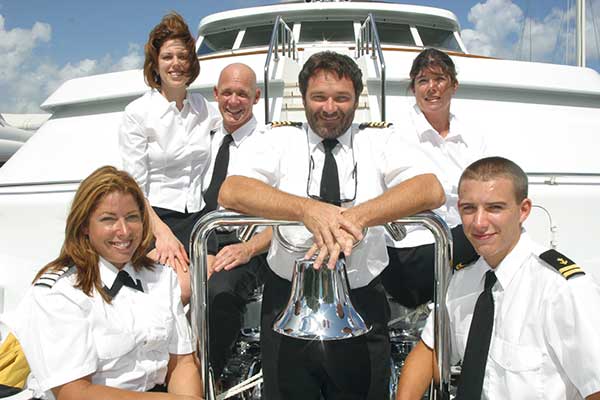

All guides , Stewardess
How much do you get paid to be a stewardess on a yacht.
- July 19, 2021
You might have watched the crew on below deck and now you want to know, what is the salary for yacht crew ?
As a Stewardess your salary can range depending, on the size of the Yacht, wether it is private or charter and the Yacht travel plans. You can expect these salaries when you get into a new Stewardess Position.
| Chief Stewardess | + 100 m | $6,000 – $9,000 US & Europe Based |
| 60-100 m | $3,000 – $6,500 US & Europe Based | |
| 2nd Stewardess | Less than 60 m | $3,500 – $6,000 US & Europe Based |
| Stewardess | General Guidelines | $3,000 – $5,000 US & Europe Based |
| Junior Stewardess | General Guidelines | $2,500 – $3,500 US & Europe Based |
You can see a full comprehensive Salary guidelines list here
This will also depend on factors such as if you choose to work on Sailing yachts or motor yachts, moreover you can select large yachts or small yachts, and decide between charter or private yachts. Together we will select your yacht type in the Kick-start Stewardess Package.
The yacht salary guidelines above can increase depending on your leave and salary package…..
Once you spend a few years in the industry and get additional training in your department you can progress into a leadership position on board.
As a Yacht Stewardess this will l ead to the Chief Stewardess position, the Salary for a Chief Stewardess can range up to 10 000/ USD per month on the largest Yachts including bonuses and tips.
- Chief Stewardess (Interior) up to 10 000 USD/month with 7-10 years yacht industry experience
- Captain (Deck ) Up to 25 000 USD /month on the largest Yachts with +10 years yacht industry experience
- Chief Engineer (Engine) Up to 15000-20000 USD/ Month on the largest Superyachts owned by billionaires such Mark Zuckerberg and Roman Abramovich.
What is the Stewardess Yacht Salary without any experience ?
When you are starting to work as a Yacht Stewardess you can expect a salary between 2300-3000€/ month and you will have at least 38 days paid leave per year.
A few things to think about:
- On larger Yachts you will have less free time , but longer and better holiday packages
- Work 3 months / Holiday 1 month
- Work 5 months / Holiday 1 month
- On Charter yachts you can earn a lot of tips but will have a lower salary and not as good holiday package.
- Salaries are not taxed, and you are responsible for your tax in your home country, if any.

How much do you earn in tips on board Superyachts as crew ?
On private yachts you can expect bonuses if you remain on board for several years, such as an annual bonus to keep the crew on board longer and create longevity. If you choose to work on Charter Yachts, you can instead work hard and long hours, but get awarded with very large tips.Tips for Superyacht crew are as follows:
- Divided equally among Deckhands, Stewardesses and the rest of the crew
- Independent of rank on board
- Usually range between 10-20% off the charter price
- Based on a weekly charter price for the Yacht size
Example of Superyacht tips for a Junior stewardess
- Superyacht size 5o meter
- Crew On board – 13
- 1 week charter – 30 000€
- After a very good job by the crew they will leave 15% tips
- This equals more than 2000€ Tips per crew member
You could earn an additional 2000€ on a charter yacht per week. If you do 8 weeks of charter in a year, which is normal for a Chart yachts you will earn an additional 15 000€ tips to your Yacht salary.
Remember that this is very hard work and long hours, but so worth it ! To start working as a Superyacht Stewardess the best way is to start with Yachtiecareers.

Yacht Deckhand Premium STCW

Yacht Stewardess Premium STCW
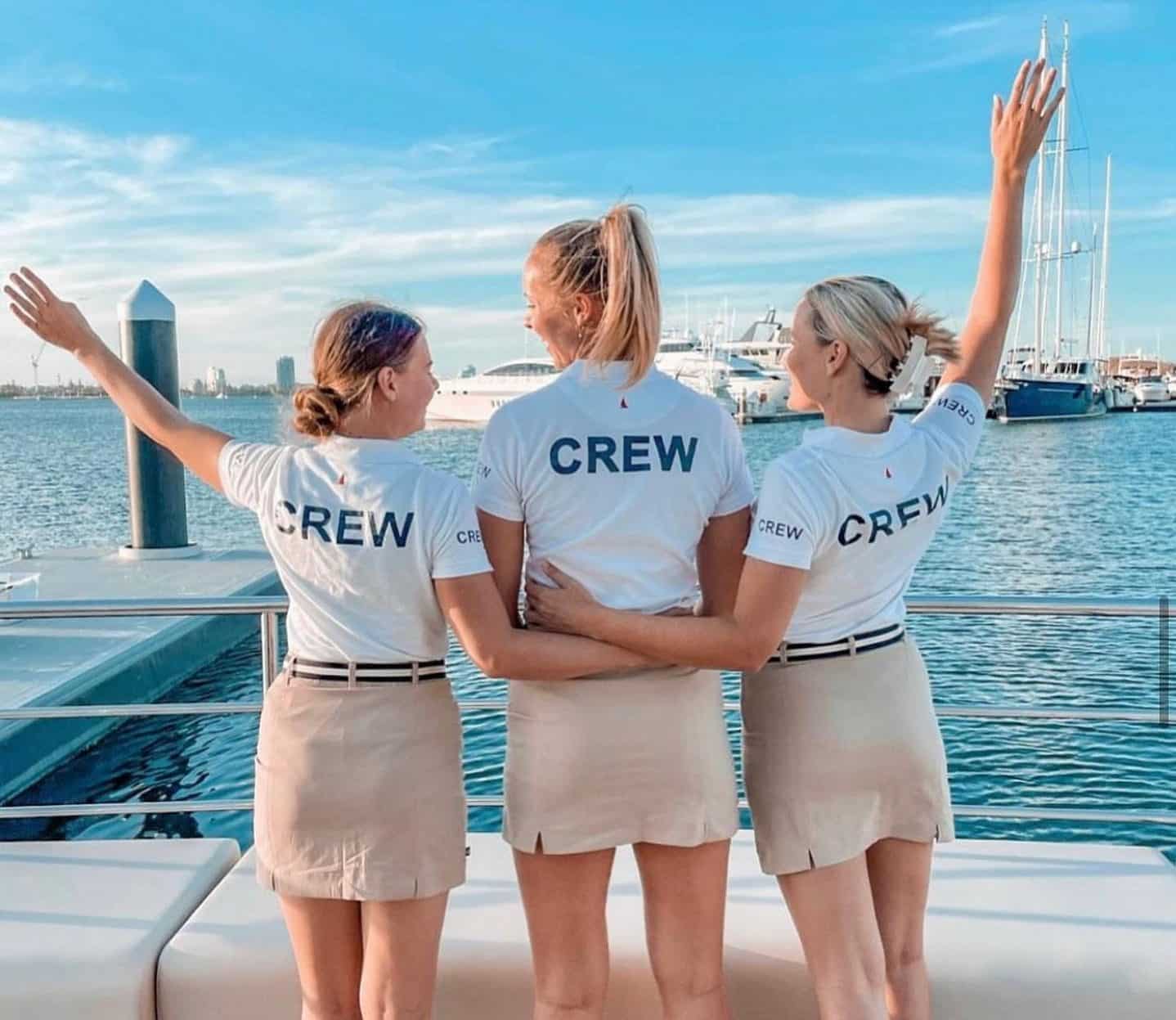
Yacht Stewardess Full STCW
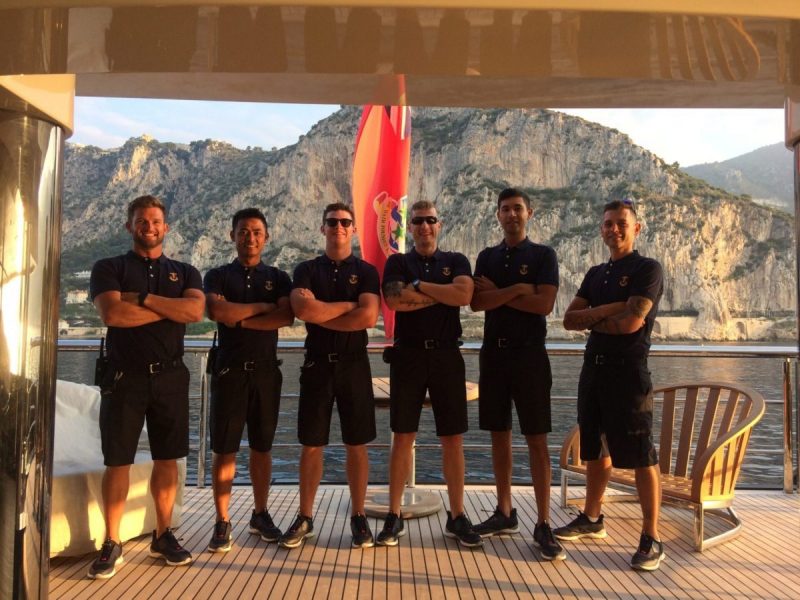
Superyacht Deckhand Full STCW

STCW Training in Holland- A Comprehensive Guide

Top 10 best places to find a Yacht job in the Med 2024?

Yacht Crew Courses for Holland: Food Hygiene Level 2

Yacht Deckhand Training in United States: Upgrade Your Career at Sea
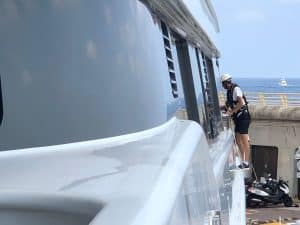
Best Yacht Deckhand Training in Florida: Advance your Sea Career

Find the Best Yacht Deckhand Training In Fort Lauderdale

All You Need to Know About Yacht Stewardess Training in United States
Superyacht crew training europe.
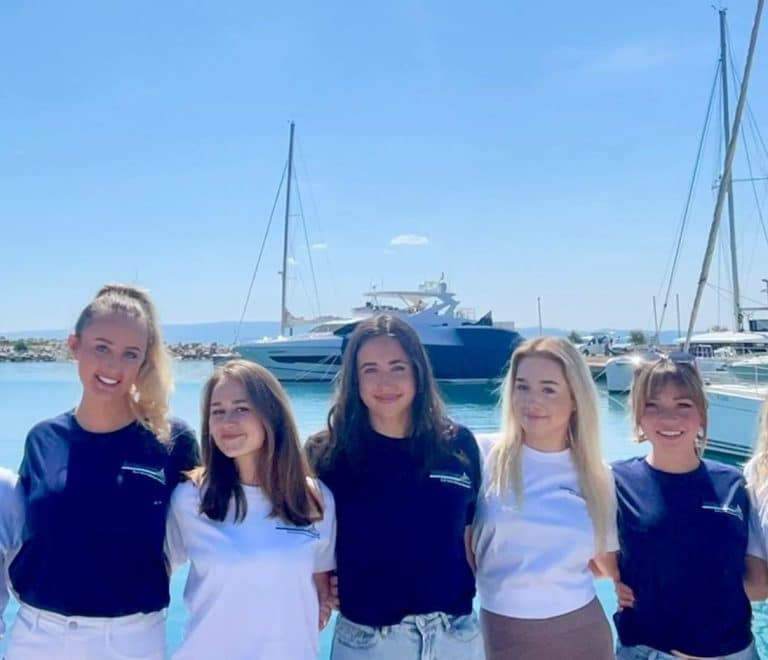
2024 Dates full. Book Final 4 spot for October date with payment plan “paylater50”
Get free yacht cv and yacht job offers
Back to Blog
Captains Careers Superyacht Industry Insights
What is the salary of a Captain on a superyacht? 4 May 2021
What should you be paying your Captain?
What salary can I expect as a Captain on a superyacht?
These are questions we often get asked at Quay Crew headquarters.
In this blog, the superyacht Captain salaries are revealed in our exclusive Captain recruitment survey by Quay Crew.
Captain Recruitment Specialist, Tim Clarke , reveals some very interesting findings…
The subject of what a Captain should be paid often comes up in conversation, normally with Captains, but recently I was working with the yacht owner on a large new build project and had to recruit everyone from the Captain down. I was asked “What should I pay my Captain?”. I had to advise on salary levels for the Captain position and this made me realise that there isn’t a lot of accurate information out there in the public domain.
So how much should a Captain on a superyacht get paid?
Recently I did a salary survey of Captains which went into significant detail regarding yacht size, program, leave, pay reviews, bonuses, flights and additional perks. 186 Captains responded so we had an excellent spread of data to work with. The full report is actually 41 pages long so this is just a brief summary of the most pertinent information.
Have a Captain recruitment requirement coming up or just want to see all the additional info? To receive a copy in your inbox, email [email protected]
The breakdown of qualifications across the 186 respondents was as follows:
26% Master Unlimited
68% Master 3000gt
6% Master 500gt
Private or Charter?
58% of Captains surveyed said they work on a purely private yacht. 34% on yachts which are a mix of owner use and charter so run commercially. Only 8% work on yachts which are purely commercial / charter programs.
Monthly salary averages for Captains on a superyacht
Average monthly salary for Captains with full rotation:
Under 39m n/a
40m to 49m €12.4k approx.
50m to 59m €11.4k approx.
60m to 69m €13.3k approx.
70m to 79m €14.5k approx.
80m to 89m €16.2k approx.
90m to 99m €18.4k approx.
Over 100m €19.3k approx.
Average monthly salary for Captains who are full time:
Under 39m €10.2k Euros approx.
40m to 49m €11.9k Euros approx.
50m to 59m €15.3k Euros approx.
60m to 69m €16k Euros approx.
70m to 79m €19.2k Euros approx.
80m to 89m €22k Euros approx.
90m to 99m €25k euros approx.
Over 100m €14.5k Euros approx.
Additional Captain salary facts…
When you compare rotational and full time salaries on yachts over 60m, the full time positions average over 2k a month more. Some yachts’ Captain packages are hugely removed from the norm. For example, one 60m to 69m is found to be paying over 25k to a full rotation Captain. No yacht that responded under 39m offers rotation. 36 Captains are earning over 20k a month, the vast majority of which are on purely private yachts.
Captain Rotation
23% of Captains on yachts 40m-49m have a full rotation. This takes a big jump to 53% of yachts 50m -59m. Full rotation peaks at 83% on yachts over 100m.
The average is 63% of Captains on yachts above 50m have full rotation so 92 out of the 147 who worked on yachts from 50m to 100m up.
Captain Recruitment for Superyachts
If you are looking to recruit a Captain for your yacht and want to make sure you are accessing the best talent in the market, then give me a call on +44 7760 202610. Recently I have recruited a variety of Captains for various yachts including a 100m plus new build, a very prestigious 90m, a 60m plus new build just launched and lots more between 50m and 70m. Alternatively if you just want a chat about the Captain market and your current Captain’s compensation package, then just get in touch via phone or via my direct email .
If you are a Captain reading this then here are a couple of links to other blogs I have written which may interest you.
How to secure your dream Captain job on a superyacht
How many Captains are there?

About the author
How much does length of service matter in Superyacht Recruitment?
Oow unlimited: is it for me.
- Superyacht Recruitment Services
- Superyacht Captain Recruitment
- Partnerships
- Meet the Team
- Work for Us
- Current Vacancies
- Crew Resources
- Candidate Login
- Candidate Registration
- Client Login / Register
- Candidate Login / Register
- Frank Magazine
- Denison History
- Virtual Tours
- Alaskan Yachts
- Azimut Yachts
- Back Cove Yachts
- Beneteau Yachts
- Benetti Superyachts
- Bertram Yachts
- Boston Whaler
- Broward Yachts
- Buddy Davis Sportfish
- Burger Yachts
- Cabo Yachts
- Carver Motoryachts
- Center Console
- Chris-Craft Yachts
- Cruisers Yachts
- DeFever Trawlers
- Dufour Sailboats
- Fairline Yachts
- Feadship Yachts
- Ferretti Yachts
- Formula Yachts
- Fountaine Pajot Cats
- Grady-White
- Grand Banks Trawlers
- Hargrave Yachts
- Hatteras Yachts
- Hinckley Picnic Boats
- Horizon Yachts
- Hydra-Sports
- Intrepid Boats
- Jarrett Bay Sportfish
- Jeanneau Yachts
- Kadey-Krogen Trawlers
- Lazzara Yachts
- Lekker Boats
- Luhrs Sportfish
- Marlow Yachts
- Maritimo Yachts
- Marquis Yachts
- McKinna Motoryachts
- Meridian Yachts
- Midnight Express
- Mochi Craft
- Neptunus Motoryachts
- Nordhavn Trawlers
- Nordic Tugs
- Ocean Alexander Yachts
- Offshore Yachts
- Oyster Sailing Yachts
- Pacific Mariner Yachts
- Palmer Johnson Yachts
- Pershing Yachts
- Prestige Yachts
- Princess Yachts
- Pursuit Yachts
- Riva Yachts
- Riviera Yachts
- Sabre Downeast
- San Lorenzo Yachts
- Sea Ray Boats
- SeaVee Central Consoles
- Selene Trawlers
- Scout Yachts
- Sunseeker Yachts
- Tiara Yachts
- Trinity Superyachts
- Viking Yachts
- Westport Yachts
Yacht Crew Jobs: How To Get Hired + Work On A Superyacht

August 7, 2020 4:50 pm
Interested in working on a yacht denison’s lead crew coordinator jill maderia details what aspiring crew professionals need to know before their first job..
Looking for a job that allows you to travel the world? Working as a crew on a superyacht may be a dream for many. Yacht crew are held to the highest standards of professionalism, catering to superyacht owners and guests to create the ultimate yachting experience. Whether you’re interested in becoming a deckhand, stewardess, or chef, we’ll break down how to enter the yachting industry and provide tips on how to prepare for your first yacht crew job.
Q: What courses do I need to complete before working on a yacht?

A: Crew must have the basic safety course called STCW. If they are working on a charter yacht, they will also need the ENG1 (medical clearance). While STCW is the basic course needed, addition courses might set you apart, as it shows commitment to a career on yachts.
For example: The Power Boat class is important to have if you are deckhand, but having this and learning how to drive a tender, would benefit anyone that works on a yacht.
Any extra courses such as hospitably, silver service, mixology are a plus and will help crew better market themselves for opportunities.
Q: After completing my courses, how do I get a job on a yacht?

A: You must have a great CV. Create a portfolio of your work. If you are a Chef or stew, have photos of your food, table settings, flower arrangements. I have had a deckhand show “before and after” projects such as teak work on deck too. Our crew website can create an album of your work.
Plus, showcase your skills. While qualifications are required, your skills that you have might be the reason you get that dream job. Many boats, especially charter yachts, seek out crew with additional skills, whether it be a stew with cooking or childcare experience, or a deckhand that is also a drone operator or photographer.
Q: Do I want to work on a private yacht or a charter yacht?

A: There are benefits to both. There is a difference, as charter boats you will have a combination of owner vs. charter guests. In addition, crew often like the benefit of the additional gratuity at the end of a charter, which can be a range of 15-20%.
Q: What is the interview process like for yacht crew?

Presentation is key: Both with your CV, and in your interview. Your first impression is important, so dress the part as much as you can. Keep in mind, many interviews are via FaceTime or Zoom. Treat virtual interviews the same as you would in-person, show up on time and be professional.
Q: How can networking help my crew career?

Go to crew events, or consider crew housing. You never know where your next job may come from. Maintain relationships with crew agents, other crew members, and industry professionals. It important to be out and meeting people in person or even virtually on Zoom.
Q: Any other tips that will help in landing a yacht crew career?

- 1) Research: Read industry publications. This is especially important for those who have never worked in the hospitality industry. In addition to taking your courses, conduct your own research.
- 2) Crew Housing: When crew stay at a crew house, they have the benefit of networking with other crew. They may even find jobs from crew mates and share ideas and tips in the industry. There are a variety of crew typically, from green to experienced and they all have a story to tell or some wisdom to share.
- 3) Daywork: Sometimes daywork can lead to long term opportunities. While daywork is temporary, crew may not realize that daywork can lead to the Captain or department head interviewing you and seeing how you might fit in with a boat full time.
- 4) Checking in: Check in with your agents. The better your crew agent knows you, the easier it is for them to properly match you to a boat. Keep your crew agent informed on if you’re still looking for work.
Ready to start your career in crew? Contact Lead Crew Coordinator Jill Maderia , or explore all the options Denison Yachting offers in our crew division.
Jill Maderia
- Email: [email protected]
- Cell: 954.600.7058
- Office: +1.954.278.9250
- Show Listings
Latest News

NEWS | August 23, 2024
Cocktails & canapés at 37th america’s cup [s/y seaquell].
Cocktails & Canapés at 37th America’s Cup [S/Y SEAQUELL] Thursday, August 29th | 19:00-21:00 Denison Yachting cordially invites you to an evening of cocktails and canapés aboard the Sailing Yacht SEAQUELL during the 37th America’s Cup Round Robins at Port Forum. Enjoy a relaxed gathering on board, set against

Newport International Boat Show [Brokerage Boats On Display]
Newport International Boat Show [Brokerage Boats On Display] Thursday-Sunday | September 12-15, 2024 Denison invites you to view a number of available brokerage boats at the 2024 Newport International Boat Show. The Newport International Boat Show, set for September 12-15, 2024, in Newport, Rhode Island, is one of

NEWS | August 19, 2024
85′ azimut 2006 sold by florent moranzoni [eva].
85′ Azimut 2006 Sold by Florent Moranzoni [EVA] EVA, an 85′ (26.82m) Azimut built in 2006, was sold by Florent Moranzoni, who represented the Seller. Special thanks to James von Eiberg of Bluebnc, who represented the Buyer. EVA can accommodate ten guests in four comfortable cabins, including a
Superyacht Crew Salaries: First Report Released
- Inspiration
Related News
Popular news this week, popular news this month, latest news.
- Yacht Charter & Superyacht News >
Written by Maria Korotaeva
Many life-long careers in the yachting industry have begun as a seasonal job or gap year with a desire to visit exotic destinations. The continual change and challenges that come with each new charter group make the positive feedback even more satisfying and those with lifelong wanderlust have a rare opportunity to see some of the world’s most incredible cities and scenery .
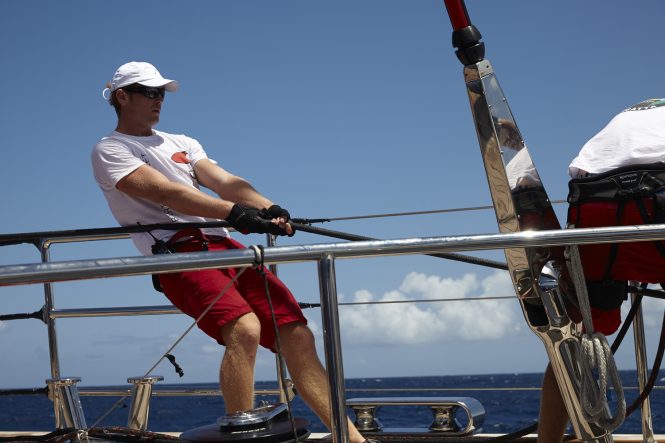
Seahwak’s Crew
Working on a luxury yacht isn’t without its drawbacks, however: Weeks at a time spent away from home, long working hours in the peak seasons and ensuring that everything runs smoothly when you’re far from the port can all take their toll. When performing tasks that can be as equally trying as they are rewarding, crew members want to assure that their pay reflects the professionalism and high degree of detail that they put into each day.
Following the launch of free salary-sharing platform www.yachtingsalaries.com in March 2016, YPI CREW has revealed its first report into the salaries paid to the crew on luxury yachts of various sizes.
Covering the period between 2016/2017, the results not only provide transparency to crew members but help employers to attract and retain individuals with exceptional skills. The occupations covered range from captains to deckhands and compare pay for permanent, private, rotation and charter crew: Find out how the charter industry measures up to the other sectors.
446 captains submitted information to www.yachtingsalaries.com, and the data revealed that 13% worked on sailing yachts and the other 83% on motor yachts. Captains on larger yachts earned more per month than captains of smaller vessels to create an upward trend, although M/Y captains of 35m-51m superyachts fared particularly well, with a jump in salary from €9,000 per month for 41m-50m yachts up to €13,000 p/m for larger luxury yachts. Private and permanent captains tended to earn the most for their size category, with permanent captains coming out slightly ahead.
Sailing yacht captains tended to earn the same as on motor yachts for the 0-35m and 35-40m vessels, earned more than motor yacht captains in the 41-50m category by €2,000 per month, and earned less than motor yacht captains by €2,000 in the 51-65m category.
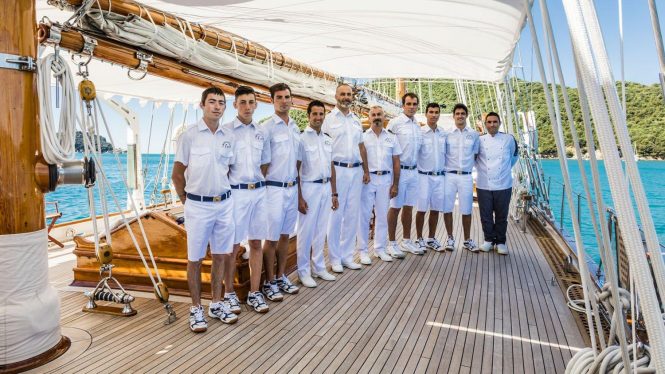
Crew aboard Crose Del Sud
Technical Crew
239 of the 434 technical crew surveyed were chief engineers, and on charter yachts, they earned an excellent salary compared to private, permanent and rotational counterparts on the same-sized yacht: In the 0-35m size category, they earned €6,000 per month compared to €5,500. Salary levelled off in the 80-100m category, with chief engineers on charters earning slightly less than others with a salary of €9,500.
Second engineers were the most stable across the sectors and received a steady pay of between €48,000, rising to €70,000 on the largest yachts. Second engineers on charter yachts were paid considerably more per month than permanent and private second engineers within the 51-65m and 66-80m categories, earning between €5,000-€10,000 more in the former category and €2,000-€5,000 per month more in the latter.
Third engineers earned between €2,500 and €5,000 per month, with the pay scale raising incrementally based on yacht size.
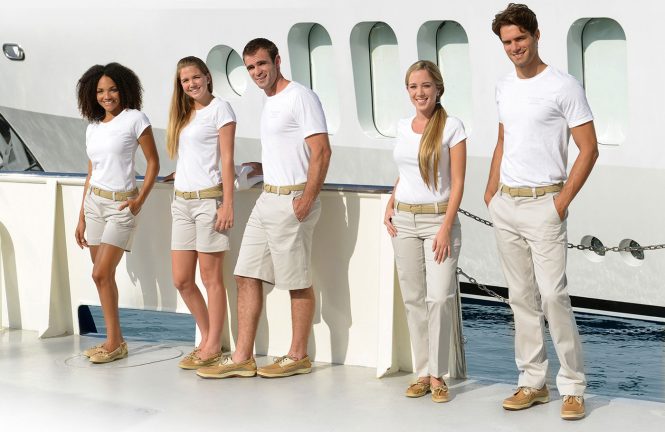
Luxury superyacht crew
Deck officers
69% of the 224 deck officers who took part in the survey were permanent and 31% rotational. Second and third officers had a greater chance of occupying a rotational position (50% and 70%), making deck officers the most likely crew members to have rotational work. Deck officers on charter yachts tended to earn less than counterparts on similarly-sized vessels, and private and permanent positions provide the most stable throughout.
Salaries for chief officers on charter yachts ranged from under €4,000 per month on 0-35m vessels to over €8,000 on 81-100m vessels and dropping slightly in the category of 101+m
Data for 2nd and 3rd officers was more sporadic, and charter position salaries ranged from €3,800 for both positions on yachts 51-65m and upwards.
Although 127 chefs participated in the survey, results were varied both for yacht sizes and sectors, producing the unusual graph where the head chefs on a 0-35m and 66-80m yacht were earning approximately the same (€4,000 per month) while on other sized charter yachts the head chefs were earning between €5,000 and €8,000. Of the head chefs who submitted data. 85% were permanent and 15% on rotation.

Dining aboard superyacht SuRi
Vessel size seemed to play a part in the salary of sous chefs, with each type of employees earning more on larger yachts. 71% were permanent, and 29% were temporary.
Pursers, Stewards and Stewardesses
For the 2016/2017 report, only 27 pursers, 68 chief stewards/stewardesses and 27-second stewards/stewardesses provided information, and there are therefore too few results to make solid conclusions about industry salaries in this area. Of the pursers, salary varies from €5,000 per month to €7,000 and remuneration did not have any correlation with the size of the yacht and salary was stable regardless of the type of employment, although results were the most unstable in the 66-80m category.

Excellent service onboard
Chief stewards and stewardesses received greater salaries for working on larger yachts, with rotation, permanent and private employment having the most stable salaries and charter crew the most variable: salary on a 51-65m superyacht was €6,500 per month, whereas under €6,000 was paid to stewards and stewardesses aboard 66-80m vessels and smaller yachts.
The results of the second stewards and stewardesses had the most variability, with charter and rotation crew earning under €3,000 for 66-80m vessels while private and permanent crew earned €5,000.
Deckhands
Deckhand salaries tended not to vary depending on the size of the vessel, and 93% were permanent and 7% on rotation aboard motor yachts, while sailing yachts had 100%, permanent crew. From the 87 deckhands that contributed to the study, data revealed that salaries tended to range between €2,100 – €3,000 per month, regardless of whether the yacht was a charter, private or permanent. Deckhands on rotation earned €3,000-€9,000 less depending on the size of the yacht.
The website www.yachtingsalaries.com currently has 2,857 searchable salaries and includes other professions such as bosun and helicopter pilot, as well as the full comprehensive report. Results are searchable at any time, and the next report is due in November 2018.
Please contact CharterWorld - the luxury yacht charter specialist - for more on superyacht news item "Superyacht Crew Salaries: First Report Released ".
- Charity & Fund Raising
- CharterWorld News
- Classic Yachts
- Coronavirus
- Cruise Ship
- Ecological Yachts
- Expedition Yachts
- Expert Broker Advice
- Feature Superyachts
- Interior Design
- Legal & VAT Yacht Issues
- Luxury Catamarans
- Luxury Gulet
- Luxury Phinisi
- Luxury Trimarans
- Luxury Yacht Design
- Luxury Yachts
- Marinas & Harbours
- Marine Ecology
- Marine Electronics
- Marine Equipment
- Mega Yachts
- Modern Yachts
- Motor Yachts
- New Launch Yachts
- New To Charter
- Open Style Sports Yachts
- Private Jets
- Sailing Yachts
- Social Media
- Sports Yachts
- Superyacht Crew
- Superyacht Photographers
- Superyacht Products & Supplies
- Superyacht Refits
- Superyacht Reviews
- Superyachts
- Uncategorized
- Yacht Builders
- Yacht Charter
- Yacht Charter Destinations
- Yacht Charter Picks
- Yacht Charter Specials
- Yacht Delivered to Owner
- Yacht Designers
- Yacht Events & Boat Shows
- Yacht Fashion
- Yacht Industry News
- Yacht Photos
- Yacht Racing
- Yacht Racing & Regattas
- Yacht Safety Equipment
- Yacht Support Vessels
- Yacht Tenders
- Yacht Videos
- Yachting Associations
- Yachting Awards
- Yachting Business
- Yachts For Charter
- Yachts For Sale
Quick Enquiry
Superyacht news:.
Email Your Yachting News to: news @ charterworld.com

Viking Recruitment expands and moves office
The 2010 Genoa Charter Yacht Show Starts Tomorrow and Features Superyacht ICON 62, TRIDENT, BISTANGO and CLOUD NINE
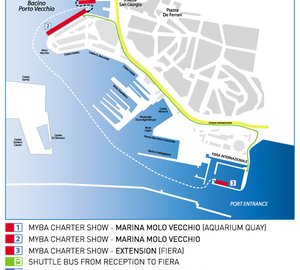
2011 MYBA Genoa Yacht Charter Show expands with extra dockage

Inaugural Superyacht Captains Forum in Auckland a success – Superyacht Captains enjoy Pacific tour
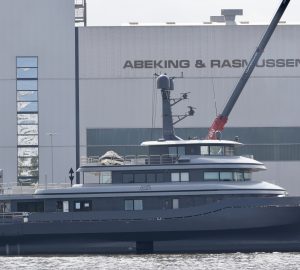
Abeking & Rasmussen’s 41-meter superyacht NURJA relaunched after refit

Aegean Yachts unveil 26m explorer yacht HEKATE

Late summer special offer on board 72m superyacht ARBEMA in the Western Mediterranean

The International SeaKeepers Society will host its 2024 annual Founders Event in October

OCEA delivers 33m motor yacht ARAOK II to her new owner

39m sailing yacht LINNEA AURORA launched by SES Yachts

A luxury charter yacht is the perfect way to encounter New England’s fall foliage display

A first look at 55m superyacht PROJECT AGNETHA from Heesen Yachts

Charter yachts offering citizen science opportunities around the world

44m superyacht ORION ONE reaches a construction milestone
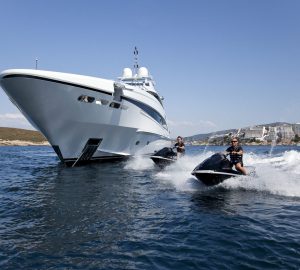
44m charter yacht JEMS offers 9 days for the price of 7 in August in Italy

37m luxury explorer yacht OCULUS brand new to the charter market on both sides of the Atlantic

Get Onboard
Superyacht Training

Do you Want to Work on a Yacht? The truth about Yacht Crew Life
We know a thing or two after having spent over 10 years living the luxury yacht life . It sounds glamorous, epic and like so much fun and totally not like a “real” job at all. I mean you get to travel the world and rub shoulders with the rich and sometimes even the famous. But pretty postcards, endless parties and bikinis it is not. It’s hard work crewing a luxury yacht. And it’s not for everyone.
Here’s the truth about yacht crew life.
It can be all the fun, sunshine, exploration and travel – but that is not the job. Yachting is an industry of extreme highs and extreme lows. Not all yachts are the same. You may strike it incredibly lucky and land yourself the utopian yacht, crew and billionaires who care. But in reality, you’re more likely to be living off Red Bull and doing 36 hour shifts, too tired to do anything but stare at the shore from your porthole window. No day aboard a yacht is the same. Workload and the type of work you’ll be doing changes depending on the season, whether you have guests on board, have any maintenance issues and also how new you are to the crew (rank & position too). A superyacht requires never ending upkeep. The yacht needs to be kept in immaculate condition, as do the crew, and the crew always need to be prepared for any situation.
Working on a superyacht is very hard work; you have to be at the beck and call of guests who have some quite particular requests that are almost impossible to fulfill. Whatever the guests require it is your job to make sure they get it. With a smile. The money is great though, but also varies based on position, qualifications, yacht size, where the yacht is located and if it’s private or charter. In general, a slightly higher salary is offered if the yacht is private with the hope that, if you work on a charter, you will make up your salary with tips. Once you have completed a particular charter you might just get a day or a night to explore the splendid ports of call with a nice big gratuity in your pocket. These kinds of opportunities are extraordinary and for that moment, any trials you may have encountered with the world’s wealthiest whilst facing unruly seas, unpredictable weather and even more unpredictable and unruly guests, diminishes.
All in all what happens to so many people in this industry may happen to you. Despite the challenges, you join for a season and fall in love with the lifestyle. Yacht life might not be for everyone, but if the bug bites you, it bites hard! Yachtie for life ! If you are thinking about getting into the yachting industry, download our eBook and find out all the insider tips of surviving , and preparing for yacht crew life.
Needing more?
Error: Contact form not found.
RYA/MCA Online
1. what are the basic requirements you need to be eligible to work in the yachting industry, 2. what is the stcw and why do i need it, 3. what is the eng1 medical certificate, 4. what land based experience will help me find a super yacht job, 5. what are the different departments onboard, 6. what crew training is required for me to work as a junior deckhand.
- Yachtmaster/Coastal Skipper Theory
- Yachtmaster/Coastal Practical
- Specialist Super Yacht Training Course (Deck Hand Training Course)
- RYA Power Boat Level II
- RYA Personal Watercraft Course
- RYA Competent Crew Certificate
- RYA Day Skipper Theory and Practical Certificates
- VHF Radio Operator’s License
7. What crew training is required for me to work as a junior stewardess?
- Stewardess Course
- Proficiency in Designated Security Duties (PDSD)
- MCA Food Safety Level 2
- RYA Powerboat Level 2
8. How do I book my training courses?
9. how do i get my first job on a yacht, 10. are these courses worth it, or am i just wasting my money, 11. will i get hired for my first job from south africa, 12. what is daywork, 13. what are the best locations to get a yacht job, 14. how much can a motor yacht stewardess or deckhand earn, 15. what are the negatives of working on a yacht, 16. what are the positives of working on a yacht, 17. is working on a super yacht for everyone, 18. what is the minimum age to work on a yacht, 19. is accommodation provided when i am completing my yacht training in cape town.
How Much Does a Deckhand Make on a Yacht? (Salaries)

Who doesn’t want to sail the high seas in the lap of luxury? Life on a yacht is the pinnacle of maritime leisure and relaxation so it’s definitely not something everyone can afford. But what if you were told you could experience life on yacht and get paid for it to boot? Welcome to a day in the life of a yacht deckhand!
Okay, so maybe you’re not going to be the guest of honor. But there are a lot of perks to being a deckhand. Of course, the salaries might not be too grand, however yacht guests have been known to give eye-popping tips. Wondering how much does a deckhand make on a yacht? Here’s the low-down.
Salary Range for a Yacht Deckhand
The salary of a deckhand on a yacht depends largely on the size of the vessel. For the most part, people will only hire a deckhand if their boat is in the superyacht category. That means a yacht that’s over 80-feet long. However there are some private yacht owners who hire a crew even if they’re operating something smaller.
As you might expect, a deckhand salary will increase as the size of the yacht increases. That means the bigger the boat, the bigger the bucks. It’s also worth considering your level of experience and designation on the boat.
There are three different deckhands found on a yacht. The first is the junior deckhand, the second is the deckhand, and the third is the lead deckhand. These job levels receive varying salaries, with each one earning more than the last.
Junior Deckhand
Junior Deckhands on a yacht earn around $2,000 to $3,000+ per month
Yacht Deckhands earn between $2,800 to $3,500+ per month
Lead Deckhand
Lead Deckhands earn roughly around $3,500 to $4,000+ per month
What’s nice about the deckhand job is that you get to work closely with the guests on the boat. That means you might be rubbing elbows with celebrities, politicians, and other prominent public figures. The deckhand also gets the most tips on board, so that salary might not be your only income stream.
Interested in Other Deckhand Salaries? See How Much These Earn:
- Barge Deckhand Pay & Salary
- How Much Deckhands Make on Deadliest Catch
- How Much Does a Tugboat Deckhand Make?
- Tuna Boat Deckhand Salaries
Salaries for Private vs Charter
If you’re looking to snag a job on a yacht, it’s important you know the difference between a private and charter yacht. The private yacht is essentially a vessel that’s used strictly for the benefit and enjoyment of the owner. So the only guests you’re going to be seeing are the ones they invite on-board such as their family and friends. You answer directly to the owner and they also pay your salary.
The charter yacht is basically a yacht that’s rented out to a variety of companies like holiday makers and corporations who want to profit off of the yacht by selling cabin tickets or vacation packages. Charter yachts see a lot of guest variety, letting you deal with and serve lots of different people.
Generally speaking, charter yachts pay less in salaries because they know you’re going to be making more tips. On average, the tips can amount to around 20% of the charter cost, and is split between the crew members by the captain.
On a private yacht, you’re much less likely to get a tip but they are willing to pay more. Private yacht owners also tend to provide bonuses if you rub them the right way, so it’s really a matter of playing your cards right and pleasing your employer.
Yacht Deckhand Job Description and Responsibilities
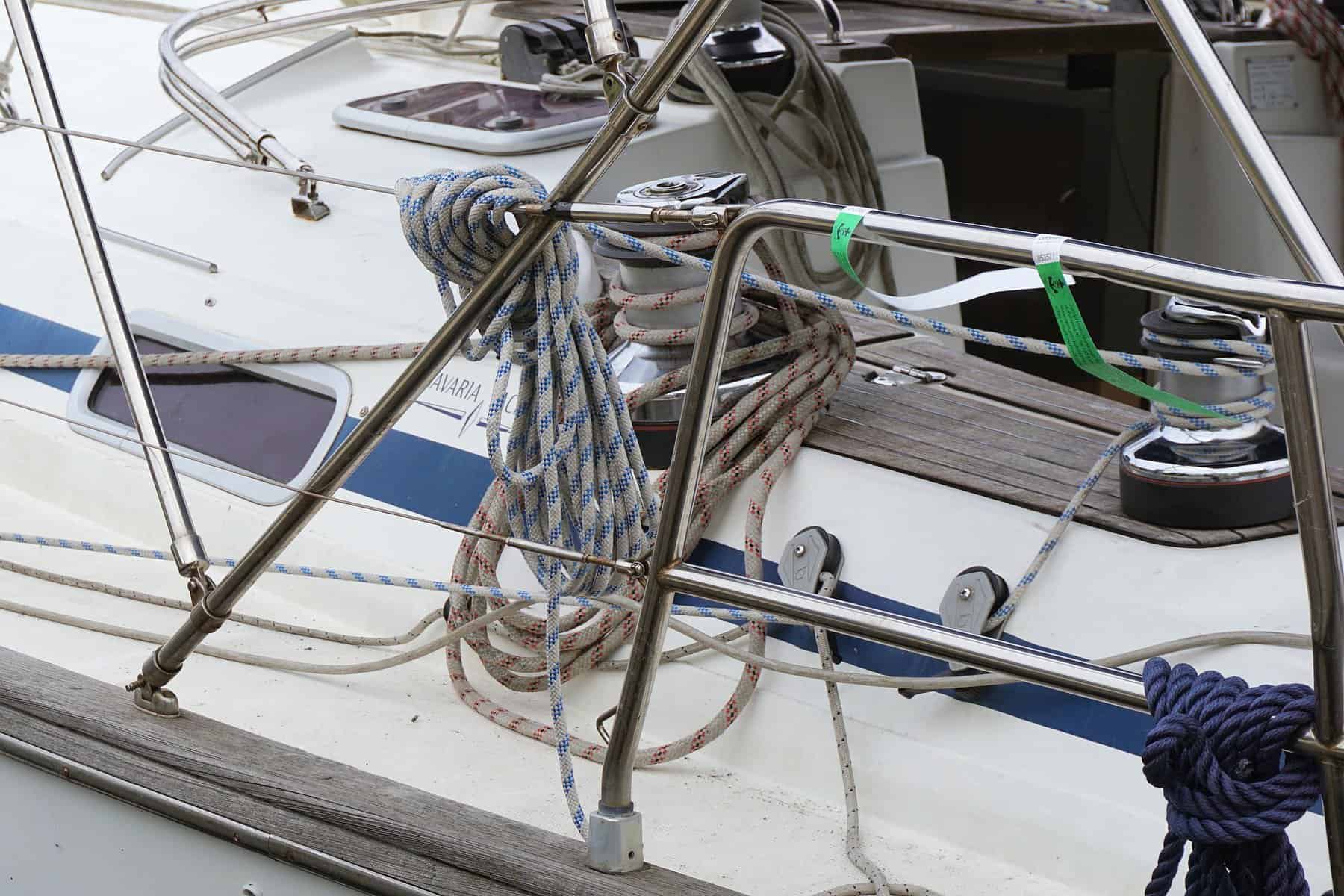
Okay, so maybe the money has made you seriously consider starting out as a yacht deckhand. But do you know what the job entails? There are quite a lot of responsibilities lined up for a yacht deckhand, and these include:
All hands on deck, and that means you, deckhand. The job of cleaning the yacht is all a part of the deckhand duty. You’re going to mop the messes, clean up after rowdy guests, and essentially make sure that everything stays clean and tidy to maintain the luxury feel.
But it’s more than just mopping and tidying. A deckhand also has to polish chrome railings, wipe glass panels to remove smudge marks, clean communal toilets, and maintain public areas after each use. You’re also going to have to clean unseen features of the boat like the inner machines and equipment that hide under the deck.
Basic Repairs
A broken air conditioner in stateroom number two? That’s your business. Minor and basic repairs of features around the boat are the deckhand’s responsibility. So expect to change a light bulb or two while you’re on board.
You should also have some basic knowledge on things like painting, caulking, filling, and varnishing, which you might have to do depending on the conditions on the yacht. Of course, for bigger maintenance problems like major repairs of equipment and machines, the engineers will be mostly responsible.
Safety Protocol Implementation
There’s a lot that could go wrong on a yacht. Slip and fall accidents, choking, and drowning -- these are just some of the dangers that await yacht passengers. That’s why all deckhands have to have some basic knowledge on life support and first aid.
But to prevent the need to use these skills all together, the deckhand makes sure that all passengers are observing proper safety protocol. That means reminding them when to wear a life jacket, and politely informing them of any potentially dangerous activity they might be doing on board.
Water Sports Assistance
Whether it’s water skiing or jet skiing, the deckhand is there to help. They’re the guys who handle the lines, deploy the water toys, and assist the guests for safe fun and enjoyment. They’re basically the all-around assistants on the yacht, doing what they can to maintain safety and keep the guests as comfortable as possible.
Not all yachts will have water toys though, but those that have them will require more than a few deckhands. On larger super yachts , lead deckhands are responsible for designating deckhands to different parts of the boat so that everyone gets the assistance they need.
Deckhands are the guys who see the deck most often. They’re the first to know when something is damaged, the first to know when guests need something, and the first to know when danger might be up ahead. So they should also be responsible for communicating with the rest of the crew.
These guys are in constant communication with the captain, engineers, stewards and stewardesses to maintain smooth sailing. They relay important information to the higher ups in order to curb potential accidents and to make the guests requests known in case they were approached for that specific purpose.
What Training is Required?
You can’t be a deckhand just like that. There are requirements and certificates you have to comply with to become fit for service. These training programs provide the necessary knowledge and skills to improve your performance and equip you for the unique challenges of the yacht deckhand job.
Certification of Medical Fitness
This is a compulsory requirement for all individuals hoping to apply as a deckhand. The certification of medical fitness confirms that you have no serious medical conditions that could affect your work on board. Remember, a huge chunk of your job is to keep everyone safe. If you have any conditions that require unique care, then you might not be able to fulfill your responsibilities.
Standards of Training, Certification and Watchkeeping
This is another requirement for all of those applying for a spot on a yacht crew. The STCW provides basic training on fire fighting and prevention, personal safety and social responsibility, security awareness, sea survival, and emergency first aid. The goal of the training is to make sure the entire crew is prepared to face potential hazards as they arise.
Deckhand Training Course
While this one’s not required, it does help improve your chances of getting a job. The deckhand training course provides you all the basics of the job, teaching you the ins and outs of the work your occupation entails. You can also add on other courses like a personal watercraft certificate that lets you safely operate and deploy things like jetskis.
What Type of Person is Best Suited to the Job?
Not everyone is a fit for the deckhand occupation. That said, if you think you have most of the following qualities, you might find the work to be a good choice if you’re considering starting a career on the sea:
- Works well in a fast-paced environment
- Handy with tools
- Good problem solver
- Patient and courteous
- Takes well to instructions and commands
- Team player
- Willingness to learn
- Works well under pressure
- Can work with minimal supervision
- Good time management skills
- Physically fit
- Takes criticism and correction well
A deckhand is one of the lowest ranking jobs on the deck, so expect to get quite a lot of correction from your superiors. But aside from that, your guests might also find reason to criticize and correct your work. So it helps to be patient and thick-skinned if you plan to work in this demanding industry.
All in a Day’s Work
How much does a deckhand make on a yacht? Not a lot if we’re talking salaries, but those tips might make up for the meager pay. And when you consider the luxury facilities and the potential of rubbing elbows with the rich and the famous, it’s easy to see that the life of a yacht deckhand is anything but boring.
Related Posts

Why are Superyachts So Expensive? [The Costs Explained]

How to Sail from California to Hawaii (San Fran, LA, +)

Fishing From a Yacht: Secrets of Sailboat Fishing
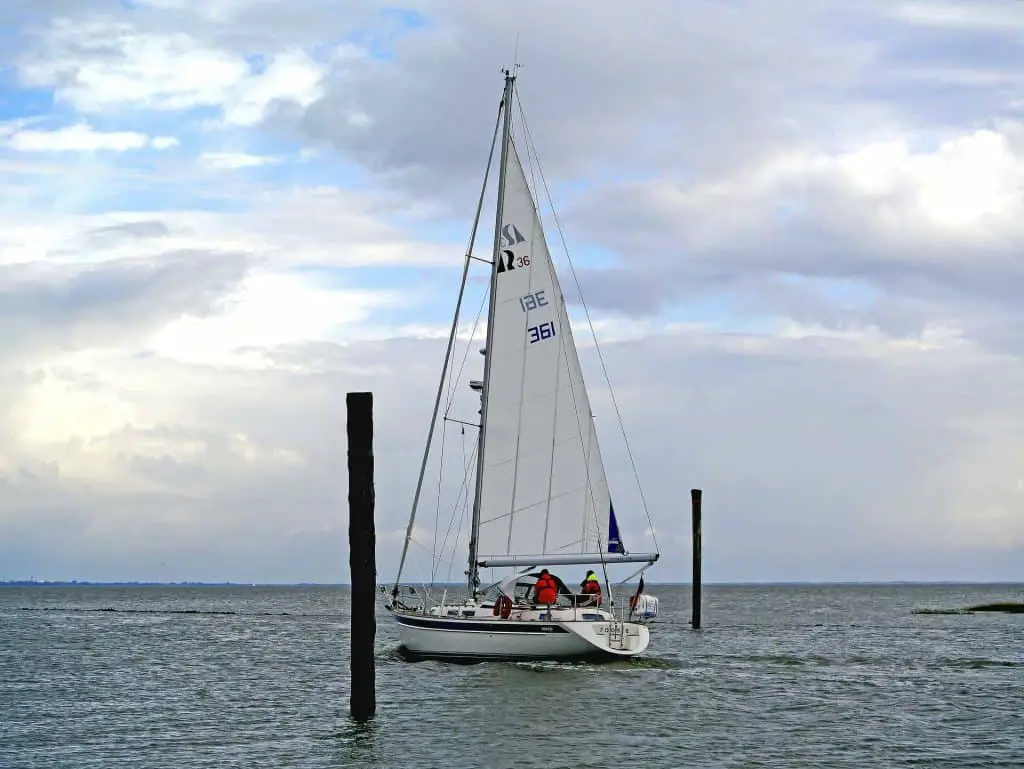
Best Life Jackets for Sailing [Top 7 Reviewed] in 2023
- Brokerage New Construction How to Buy How to Sell
- Yacht Fleet Yacht Catalog Charter Marketing Destination Guides
- Financial Services Payroll & Accounting Payroll Service Process Logistical Support Admin Services Crew Admin
- Job Descriptions Crew FAQ
- About Sitemap

- Yacht Department Directory
- Deck Department
About the Deckhand
A deckhand is a position aboard with primary duties including cleaning and maintenance of the exterior of the vessel. Vessels will usually consider a successful candidate that already has experience in the superyacht industry and is keen to learn and work hard. It is essential that the deckhand can perform assigned tasks efficiently with a positive attitude in addition to interacting with owners and guests in a professional manner.
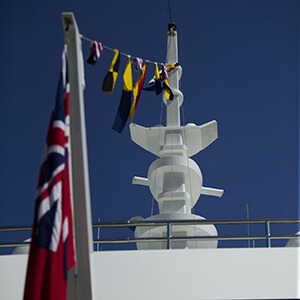
Job Responsibilities
- Cleanliness of the yacht wash downs, stainless polishing, waxing
- Assisting bosun and mate in maintenance projects; sanding and taping up for varnishing or painting, caulking, filling
- Continued learning of yacht maintenance, operations and systems; line handling, tender driving, navigation, safety, water sports
Required Skills
- Good work ethic
- Positive attitude
- Ability to learn on the job
- Ability to take direction
- Professional appearance
Salary Modifiers
- Engineering experience or certificate
- Sports certification (i.e. dive certificate, kite surfing instructor)
- Extensive fishing knowledge
- Tender driving license
- Carpentry skills
- No tender driving certification
Position Statistics
Career path, senior master, junior captain, first officer / chief mate, officer of the watch, junior deckhand.

Everything you need to know about being a superyacht chef
- Chef Interviews
- Beach destinations for yacht chefs and foodies
- The Ultimate Port Guide: Rybovich, West Palm Beach, Florida, USA
- The Ultimate Port Guide: Berth One, West Palm Beach, Florida, USA
- The Ultimate Port Guide: Savannah Yacht Center, Georgia, USA
- The Ultimate Port Guide: Port Denarau Fiji
- The Ultimate Yachtie Guide To Antibes And Cote D’Azur
- The ultimate Yachtie guide to Barcelona, Spain!
- Dockwalking for yacht chefs [updated 2022]
- The Ships Cook Certificate: What you need to know
- How to get a job on a super yacht as a chef
- Private Vs Charter
- Starting as a crew chef
- Superyacht crew agents
- What certificates does a Superyacht Chef need?
- Working as a yacht stewardess vs crew chef
- Yacht crew in the wild
- Yacht Chef Job Board
- 5 Best Cookbooks for 2019 for yacht chefs
- 5 of the best chef gadgets for 2019
- 5 knives every chef needs in their knife roll this season
- The Yacht Chef cookbook of 2020 : The mymuybueno cookbook
- Short order
- cooking classes
- Crew Food: How It Can Make Us Better Chefs
- Crew meal ideas
- Crew Preference sheet free printable
- Crew Weekend Food Ideas
- Sample Yacht Chef Menu
- The BEST vegan cookbooks for yacht chefs
- Writing a killer yacht chef cv is easy!
- Worldwide Superyacht Provisioning Spreadsheet
- Yacht Chef Websites
- Work with us

Should I work on a private yacht or charter yacht as a chef?
There are always so many questions regarding private or charter yachts, especially starting out in the industry, which one do you go for? Which route do you take?
Everyone seems to have an opinion about working on charter vs private yachts. A yacht chef salary on each can vary considerably, which of course will sway your opinion on what sort of super yacht you want to work on. After all, who doesn’t want to be on a decent salary!
Read Also: Should I be a crew chef on yachts to enter the industry?
But there is more to it. Private yachts and charter yachts are run very different. Not only do they offer different cruising programmes, salaries and bonuses but they also often have a totally different vibe on board. And I don’t just mean with the crew. Sometimes guest interaction can be a totally different ball game too.
Let me explain…
Private yachts vs charter yachts

Private Super Yachts
Some of my favourite yachts to work on have been private yachts. Having that personal connection with the owners can really turn your job into an awesome one. Working as a chef certainly has it’s perks. It is not unheard of for yacht owners to like their chef so much, that they are whisked away in the private jet. Many go on to work at other land based estates or villas for the owners. While some accompany the guests on their other luxury vacations and continue working as a private chef.
Working on private yachts as a chef also means learning to know their preferences. As a chef, you get to know your guests intimately. You will know very quickly which foods and cuisines they love and which ones they don’t. Private yachts give you the time to develop menus perfectly catered for your guests. You can still surprise them with new and exciting dishes, but with the insider knowledge that you understand their palate.
“When you can make anything and everything you want because you know the owners will love it makes such a difference to any chef job”
Don’t get me wrong, sometimes it can be the opposite. The owners may want to eat the same dishes, with the same ingredients all the time. It’s then up to you to try and sway them to try new things, again if you can. Some yacht chefs love this sort of work. You can pump out the dishes almost on autopilot and use the crew to experiment on instead.
When working on private boats having the same owners can be a blessing. You can become very close to them and their friends and extended families.
Being present with them at every meal adds a personal touch. It shows that you really care about what they think of your food. Depending on the owners, this feeling of appreciation can go both ways.

Provisioning on a private yacht
Provisioning for a private boat is sometimes a lot easier as again, you know what ingredients the guests like. Private yachts have varied budgets for the galley. Some private yachts will be just as extravagant with the guests and crew food budgets. While others will really tighten the reins. There is no hard and fast rule on galley budgets for private yachts. It is worth clarifying this in your interview before you accept the job!
Which brings us to the money.

How much money does a private yacht chef make?
Do you make less money working on a private boat? Do private yachts still tip at all? I’m sure you have heard these sorts of conversations happening with other green crew over beers at the local dock bar. It’s normal to wonder what the average wages are as a chef on yachts. After all, we dedicate our lives to being at sea and away from our loved ones. It’s only fair to assume we get paid well for it.
A yacht chef working on a privately owned yacht does generally get paid a little bit less on the their monthly salary over someone on the same sized boat working charter. However… and this is important … A yacht chef on a private yacht may not be under the same workload as a charter yacht chef. Furthermore, a yacht chef on a private boat may also be privy to more lenient downtime, or more accrued leave on their contract. And that’s without even discussing possible rotation!
Private yacht chef owners and their quirks
If you are on a smaller private yacht, say, under 70m, often the guests will communicate better with the chef. You might be informed of parties and additional guests well in advance so you can plan. Or you may have your owners trip dates planned months ahead too. Of course, you may end up on a private yacht where the owners do not communicate much. Or who show up with a few hours notice and expect a sit-down lunch for 25 of their closest friends. You win some, you lose some.
Every private yacht owner is different, and their preferences and diets are also varied. With private yachts, you will know during the interview process how the boat will be run. From there you can decide if the programme and preferences are your sort of vibe or not. If it’s not, there will no doubt be another private yacht owner who is better suited.
Niche chefs will most likely be more interested in working for a private yacht owner. If you are a specialised chef in certain cuisines, such as Jewish, Vegan, Russian or Middle Eastern, you may prefer an owner who also enjoys those cuisines frequently.
Private yachts are known to be the ‘safer’ option. But this is not always the case. A lot of chefs love the element of surprise and to show their creativity more. So this leads me nicely onto charter yachts.

Charter Superyachts
I have worked on some awesome charter yachts, but like any yacht they have their positives and negatives. A good charter yacht is a totally different world in yachting. Working on a charter yacht as a chef can be one of the most rewarding jobs you can do. Why?
Because, every, single trip is different!
This is the fun, most spontaneous part about working on a charter yacht.
“You get that buzz, that anticipation that element of surprise every single time a new guest steps on board”
I actually find it quite thrilling when a guest steps on board and you only have the vague guest preference sheet to go off. Sometimes it can be the worst thing in the world, not knowing. Other times, it can be great because you are able to guide the guests into the charter experience that works best for you, and for their enjoyment.
The big questions are : Are they going to throw spontaneous parties?. Will they want beach BBQ’s daily?. Do they like small courses and lots of them or do they prefer a family style buffet dinner?
The list is endless, and it feels like a really difficult jigsaw puzzle to figure out at times. But when it all comes together, you will be riding that buzz of working the charter season to the end!

Charter guest preferences
The most important thing to have pre ready for any charter is a detailed preferences list, what the guests like and don’t like, because this is what you will base all of your dishes on. If you don’t have this, then the worlds your oyster- but not in a good way because you can plan all these wonderful meals and then have them come to you saying they don’t like caviar (as an example, and that is a real punch in the stomach)!! As you can guess this can be extremely stressful for any chef, so getting a DETAILED preference list is with utmost importance.
Sometimes and actually quite often they have surprise guests turning up, or even guest switching mid trip (you may be lucky enough to get a pre warning about this, and you can get their preferences but not always) so this can throw a curve ball in and you have to think on your feet.
Every meal is a chance to show what you can do, to show your creativity and really have fun and show all your skills with every dish you make. Some chefs love to do Michelin star like dishes, whilst others love to do more buffet style (especially if it’s a family or a chilled lunch) and also you can do live cooking shows – personally these always go down well with ANY guests I’ve ever had.

Charter yacht chef table service
I’ve also found that charter guests love to see the chef at every meal, they love to see the person behind the beautiful dishes they are receiving.
Going out and seeing them to talk over your next meal ideas, or seeing what their plans are for activities so you can plan the type of lunch they would like I think is a bonus for them and also for you, you can plan more, which again is key.
Be prepared for a random, spontaneous request at anytime. Often this is a birthday they forgot to tell you about (or 3 birthdays at one time- yes I’ve had this), or a 2am feast after they’ve got in from the nearest town (Be prepared to get out of bed anytime!) this can be tiring and overwhelming, and you may not get your 6 hours sleep every night, let alone have a break in the day. But being prepared for this and knowing that there will be times like this, eases the stress when it does happen, because it will! After all its charter and the charter does end eventually.

So, how much does a charter yacht chef make? How big are those charter tips, really?
You may have heard that crew on charter yachts get tipped really well. You may have even heard the stories about certain yacht crews getting upwards of twenty thousand Euros for a charter. And while some of these stories are true. (Yes, I can vouch for knowing of a 20k+ tip) many are also inflated by other green crew wanting to sound “cool”.
A usual charter tip is around 10% of the charter cost, minus additional expenses from the APA.
TIPS ARE NOT GUARANTEED ON A CHARTER BOAT!
I cannot stress this enough. So many crew come on board a charter yacht thinking they have hit the big time and they they will walk away with full pockets from the tip. Be mindful that a tip is exactly that. Do not relay on it to bump up your wage.
Do not accept a low paying job on the basis that “We did 2375754 charters last season and the crew made millions”. #rolleyes
You should get between 700-2000Euros as a tip on yachts below 60m as a “bad” tip, and upwards of 2k for a week where you have happy guests who are also good tippers.
Yachts over 80m can easily get 5000Euro tips per week, but again, it is never guaranteed….
How to write an amazing CV to land you the best job possible in the industry. Buy your CV through our partners Superyachtcvs and ask about their chef websites.

So, should you work on a private or charter yacht?
Comparing charter and private is quite hard, because they really are so different depending on the guests or owners you have. Also the crew plays a massive role in this too.
I stand by saying that having a great crew around you is one of the MOST important aspects about working on any yacht, private or charter. Team work is key!
Working on a private yacht has a very different list of demands to working on a charter boat. Both can be tough, or easy, depending on your skills. Honestly, I think all yacht chefs should try and work both sides in their yachting career, just to get a taste for it.
What do you prefer? Private or charter?
Leave a Comment Cancel
Your email address will not be published. Required fields are marked *
Email Address *
Save my name, email, and website in this browser for the next time I comment.
How to get a job as a superyacht chef
300+ free crew food recipes, yacht chef portfolio websites.
A creative space for Superyacht Chefs to share and engage. List your jobs, apply for jobs. Share knowledge and opinions. Celebrate your wins. Get yacht chef related discounts and insider help.
New to yachting? Green Yacht Crew? : Start HERE!
Professional yacht chef cv writing, yacht chef cv writing tips, recent jobs.
- Fort Lauderdale
- Never Enough ll LLC
Click here for our favourite yacht chefs ;)

The global authority in superyachting
- NEWSLETTERS
- Yachts Home
- The Superyacht Directory
- Yacht Reports
- Brokerage News
- The largest yachts in the world
- The Register
- Yacht Advice
- Yacht Design
- 12m to 24m yachts
- Monaco Yacht Show
- Builder Directory
- Designer Directory
- Interior Design Directory
- Naval Architect Directory
- Yachts for sale home
- Motor yachts
- Sailing yachts
- Explorer yachts
- Classic yachts
- Sale Broker Directory
- Charter Home
- Yachts for Charter
- Charter Destinations
- Charter Broker Directory
- Destinations Home
- Mediterranean
- South Pacific
- Rest of the World
- Boat Life Home
- Owners' Experiences
- Conservation and Philanthropy
- Interiors Suppliers
- Owners' Club
- Captains' Club
- BOAT Showcase
- Boat Presents
- Events Home
- World Superyacht Awards
- Superyacht Design Festival
- Design and Innovation Awards
- Young Designer of the Year Award
- Artistry and Craft Awards
- Explorer Yachts Summit
- Ocean Talks
- The Ocean Awards
- BOAT Connect
- Between the bays
- Golf Invitational
- BOATPro Home
- Superyacht Insight
- Global Order Book
- Premium Content
- Product Features
- Testimonials
- Pricing Plan
- Tenders & Equipment

How much should you tip crew on a superyacht charter?
It's customary to tip the crew at the end of your luxury yacht charter holiday. So what is the accepted tipping amount? And how should gratuity be given? If you're confused about tipping protocol on board a charter superyacht, read our tipping guide...
What is the accepted amount to tip?
In general, brokers advise tipping between 5 to 20 per cent of the base charter fee, depending on the yacht and the location. It is usually towards the lower end of that scale in the Med and higher in the US and Caribbean .
Are there any official guidelines?
In the 2000s, problems started to arise when generous charterers began to tip 25 per cent or more. The situation became difficult when crews started expecting large tips and were disappointed —sometimes audibly — with lesser amounts.
As a result, the Mediterranean Yacht Brokers Association (MYBA) issued tipping policy guidelines, which listed 5-15 per cent as the customary range.
These guidelines now seem to have taken hold as the accepted norm and also provide a charterer with a reference point beforehand. By asking your broker if the yacht supports the MYBA recommended guidelines, you’ll know what is expected.
Do I have to tip in cash?
Generally, tips are given in cash to the captain but there are other methods of tipping too. Maggie Vale from Churchill Yacht Partners explains: "If there are Advanced Provisioning Allowance (APA) funds remaining after the charter, I advise my clients to leave this with the captain, as he is already holding it, then add any amount they would like to that."
"Alternatively, clients can wire gratuity ahead for the broker to hold in escrow to avoid carrying a large amount of cash. After the charter is over, the client will let me know how much to release to the crew (based on any leftover APA) and I can wire the difference back to the client," advises Vale.
How should I decide what percentage to give?
When deciding on what percentage of the base rate to give you should take into account that a charter crew normally works 16-18 hour days from dawn to midnight. As in all aspects of life, a tip should be proportional to the service you have received.
Is there a tipping etiquette?
Yes, all tips should be given directly to the captain so that they can divide the amount out between all the crew. It is important to remember that there may be crew that have worked just as hard as others but have been less visible during your trip.
Can I tip some crew more than others?
Although it maybe be tempting to try and specifically recognise a member of crew that has gone out of their way to make your trip special this is not advised. All the crew work as a team and therefore should be rewarded as such. Regardless of the size of the tip, it will be distributed across the entire crew anyway.
For more charter etiquette advice, make sure to check out our handy guide on charter dos and don'ts.
More stories
Most recent, from our partners, sponsored listings.
'Below Deck's 10 Worst Charter Guests, Ranked

Your changes have been saved
Email is sent
Email has already been sent
Please verify your email address.
You’ve reached your account maximum for followed topics.
The Below Deck guests are part of the franchise charm, but some visitors had obscene demands and left a poor impression on both the crew and the viewer's minds. In every charter season, the yachties entertain a handful of guests. They do their best to always say “yes” on a super yacht, no matter the request. Whether the guests want a stripper, a ten-course meal, or a blowout on the beach, the Below Deck crew members often find a way to make their dreams come true.
And yet, some guests were insatiable, requesting more demands than their presence sheets listed. Others had a nasty attitude and disregarded critical superyacht safety rules. Some guests even destroyed property on the yacht, making the crew's job even more difficult than it already was and upsetting the Captain . Here are some of the most troublesome guests and what they did to earn their villainous title within the franchise.
10 Timothy Sykes
Usually, charter guests expect a seven-star luxury service when they board a superyacht. Others expect a typical day just on the ocean. While Timothy Sykes may not have had many outrageous demands, complaining and returning almost every meal was certainly annoying. Especially since those gourmet meals were traded for something more traditional, like chicken tenders for his girlfriend. The food wasn't the only problem for this guest.
The Wi-Fi was inconsistent, making it difficult for him to work as a day trader on the yacht. Snorkeling and half-underwater lunches are not for everyone. However, what particularly made Timothy a villain in the franchise was waving an envelope full of cash in front of Captain Lee Rosbach's face and then removing 5 grand from it, leaving the Below Deck crew with only a 17-thousand dollar tip.
9 Steve Bradley
According to the various Below Deck members, drunk and handsy charter guests are part of the yachting experience. Unrealistic expectations are also part of the yachting charm. Sometimes, guests are all of the above . Steve Bradley appeared in Season 3 with some crazy demands, like a foam party when the weather wasn't suitable.
He also made inappropriate comments about how the stewardesses should wear a bikini . It turned out that ‘Uncle’ Steve was totally harmless and just liked to go buck wild on vacation. He appeared later in the series with similar demands, but since the crew already knew him, the second time around wasn't as uncomfortable.
8 Charles Yim
Sometimes influencers, clout chasers, or other reality stars will join the series, and they would also like to carve out memorable moments with the franchise. In Season 6, fellow reality star Charles Yim joined the superyacht. The trip was for both work and fun, but the Below Deck cast members were uncomfortable with how much time the guests spent on their devices.
To make the situation worse, when steward Caroline Bedol went to clean the suites, she found a used condom on the nightstand. The string of surprises continued as, later on, the crew also claimed the guests were having sex on the deck, and they could see it all on the cameras. While his group may have been boring compared to the other guests, his lack of regard for privacy or the crew members' jobs certainly earned him a villainous title.
7 Michael Blackton
‘Uncle’ Steve and his flirtatious ways may have been harmless, but the same cannot be said for the other guests. Michael Blackton would appear in Season 7 and develop a liking for stew Simone Mashile . This wasn't the first time she'd encountered flirty charter guests, but this quest would be the hardest to fend off.
She tried to avoid his advances and maintain a level of professionalism, but Michael wasn't taking no for an answer. The flirtatious behavior was beginning to escalate, making everyone, especially Simone uncomfortable. As a result, Chief Stew Kate Chastain had no choice but to keep Simone separated from Michael to make sure she was safe for the rest of the trip.
6 Chelsea Gonella
This guest baffled everyone on the boat, especially Chef Rachel Hargrove . In Season 9, charter guest Chelsea Gonella would board the superyacht with a broken jaw. Her mouth was wired shut and, as a result, she couldn't eat solids . This meant that the Below Deck Chef needed to blend every meal. While the other guests were eating delicacies like lobster on perfectly plated dishes, Chelsea was sucking it up through a straw.
To make matters worse, though, she never seemed satisfied. She was still hungry and stressed the Chef out even more. At one point, the other guests refused to eat until Chelsea had her meal. Ultimately, no one, especially Rachel, could understand why she wouldn't reschedule the vacation like a “normal person.” In the end, they were left with a measly 22 thousand dollar tip, piercing Rachel's already broken heart even more.
5 Krystal Bradley
This spot goes to another guest in Season 6. When the crew received the preference sheets, they thought this trip was going to be a fun little girl's adventure. They would soon realize that Krystal Bradley was one of their worst nightmares. Krystal, like many of the other guests, was overly demanding. That wasn't the main issue, though . Krystal also had a knack for laying hands on other people when she was intoxicated.
First, she got into a fight at the dinner table. Then she passed out, which was a blessing for everyone because her friends left her there, knocked out. They later returned to help her to her room, but Krystal had other plans and responded by punching her friend in the face. What made their stay even worse was how she acted like nothing happened the next day once she sobered up.
4 Brandy Bock Tott
It's not uncommon for the Below Deck stars and guests to let loose while vacationing on a superyacht. It's also common for guests to enjoy alcohol, or even request to have a drink in their hand at all times. Brandy Bock Tott from Season 7 was on another level, though. It was obvious that the charter guests were partying before they arrived, as Brandy showed up on the yacht incredibly wasted.
Her intoxication levels were already worrisome for the crew, especially since she was either sleeping off the liquor or drinking wine and mimosas nonstop. However, their charter got worse after she passed out on an excursion. To make matters worse, her group of friends seemed unbothered and barely gave Brandy a second glance. As a result, the Below Deck crew was left to tend to the passed-out drunken guest, only to find out that she had been drinking champagne every day for two weeks before her arrival.
3 Delores Flora
The Captain and the Below Deck crew do their best to give the guests whatever they want. No request is too big or too small. While they try to make sure all guests are satisfied, they have to prioritize safety above all. They are at sea, surrounded by predators, after all. Unfortunately, though, Delores Flora from Season 8 didn't seem to get the memo. Like many of the other guests, Delores got way too drunk and struggled to hold her liquor. After a few drinks, she was ready to party, which meant she wanted to jump off the boat late at night.
Captain Lee wasn't convinced the waters were safe enough, so he told the guests no. Delores thought she was above all because she jumped in, anyway. Captain Lee was irate and ready to cancel the entire charter. The crew had to take turns watching her room to make sure she didn't escape again. In the morning, Captain Lee decided it wasn't fair to punish the entire charter group, so he only made Delores go home. Delores wasn't finished leaving her final impression, though. On the way out, Delores jumped off the tender boat that was bringing her back to shore, ultimately proving Captain Lee made the right call.
2 Justin Richards
Sometimes, guests are rude to the workers and make their jobs more difficult. While it's not always appropriate, rude guests, especially when intoxicated, comes with the Below Deck territory . However, Justin Richards from Season 9, took it way too far. On the first night, most of the guests had gone to bed, except for Justin and a female guest. They were drinking and arguing, but at some point, their argument became a little too intense.
Both guests were beyond drunk and were crossing into belligerent. The crew tried to step in and smooth over the situation and suggested that maybe it was bedtime. Justin wasn't pleased. So instead of going to bed, he told Chief Stew Heather Chase to “go f**” herself and "Go throw yourself off the boat.” Captain Lee wasn't happy at all and was ready to cancel the charter trip.
1 Karan Bakshi
Some guests were never satisfied, no matter how hard the Below Deck crew worked. This was the case for Season 10 guest, Karan Bakshi . Karan boarded the superyacht with his family and a list of outrageous demands . One request in particular was to have hookah-friendly smoking spots. Fraser Olender and the interior crew made it happen, but that didn't stop the guests from pushing their limits.
They still tried to light up the hookah inside, almost causing a fire. They partied on the deck until 5am, making second stew Alyssa Humber stayed up all night with them . After they left, interim Captain Sandy Yawn realized they had broken property on the yacht and left burn holes. To top it all off, their tip was a measly 20 thousand, despite the crew going above and beyond in ways they had never before.
Watch On Peacock
KEEP READING: What’s Going On With ‘Below Deck Down Under’s Captain Jason Chambers After Season 2?
- Work & Careers
- Life & Arts
- Share full article

The For-Profit City That Might Come Crashing Down
The dream of Próspera, founded by a U.S. corporation off the coast of Honduras, was to escape government control. The Honduran government wants it gone.
Ricardo González, legal consultant for Honduras Próspera Inc., looking out on the Honduran island of Roatán. Credit... Brian Finke for The New York Times
Supported by
By Rachel Corbett
- Aug. 28, 2024
Jorge Colindres, a freshly cologned and shaven lawyer, handed me a hard hat to take the elevator to the 14th floor of what is now the tallest building on the Honduran island of Roatán — nearly twice what the local building code allows. When construction is complete, Duna Residences will house 82 units overlooking a jungle of palm trees, the Caribbean Sea and several other new buildings that the Honduran government considers illegal.
Listen to this article, read by Frankie Corzo
If Próspera were a normal town, Colindres would be considered its mayor; his title here is “technical secretary.” As we looked out over a clearing in the trees in February, he pointed to the small office complex where he works collecting taxes and managing public finances for the city’s 2,000 or so physical residents and e-residents, many of whom have paid a fee for the option of living in Próspera or remotely incorporating a business there. Nearby is a manufacturing plant that is slated to build modular houses along the coast designed by Zaha Hadid Architects. About a mile in the other direction are some of the city’s businesses: a Bitcoin cafe and education center, a genetics clinic, a scuba shop. A delivery service for food and medical supplies will deploy its drones from this rooftop.
There’s not much else to see yet. But the Delaware-based company that founded this experimental town in 2017 has raised $120 million in investments — including from venture-capital funds backed by the Silicon Valley billionaires Peter Thiel, Sam Altman and Marc Andreessen — to transform the territory, about twice the size of Monaco, into the most developed start-up city in the world. Built in a semiautonomous jurisdiction known as a ZEDE (a Spanish acronym for Zone for Employment and Economic Development), Próspera is a private, for-profit city, with its own government that courts foreign investors through low taxes and light regulation. Businesses can choose a regulatory framework from a menu of 36 countries or customize their own.
A California company offers a Montessori education for approximately 60 students. Security is provided by a private firm of armed guards. An arbitration center staffed by three retired Arizona judges handles dispute resolution. (In order to enter the jurisdiction, I was told I needed to sign an “agreement of coexistence” binding myself to 4,202 pages of rules, violations of which would be subject to the jurisdictional authority of the arbitration center.)

Próspera has become particularly well known for the zone’s experimental medical facilities, which run clinical trials unburdened by F.D.A. standards. The week of my visit, Patri Friedman, grandson of the economist Milton Friedman and the founder of a start-up-cities fund that invested in Próspera, had a chip with his Tesla key implanted into his hand. On a previous trip he brushed his teeth with genetically modified bacteria purported to prevent cavities. Another time he was injected with a protein booster intended to make him “stronger and faster,” as he put it at a conference in Roatán that weekend.
“I can tell you when Próspera became most real for me,” Friedman told the audience. “When I sat down to fill out my informed-consent forms that said, like, ‘This agreement is adjudicated under the laws of the Próspera ZEDE; any disputes are arbitrated by the Próspera Arbitration Center.’ Like, you are under a different set of laws.”
There are more than 5,400 of these special economic zones in the world, ranging on a spectrum from free ports for duty-free trading all the way to the special administrative region of Hong Kong. About 1,000 zones have cropped up in just the past decade, including dozens of start-up cities — sometimes called charter cities — most of them in developing nations like Zambia and the Philippines. Some have actually grown into major urban centers, like Shenzhen, which went from a fishing village to one of China’s largest cities, with a G.D.P. of $482 billion, after it was designated a special economic zone in 1980.
Each zone offers a degree of escape from government oversight and taxation, a prospect that has excited libertarian and anarcho-capitalist thinkers at least since Ayn Rand imagined a free-market utopia called Galt’s Gulch in “Atlas Shrugged.” Today, escalating clashes between the government and Big Tech — like the S.E.C.’s regulatory war on crypto, or the Federal Aviation Administration’s repeated investigations into SpaceX — have spurred some Silicon Valley entrepreneurs to seek increasingly splintered-off hubs of sovereignty. And with government dysfunction preventing reforms even in wealthy cities like San Francisco, locked in a decades-long affordable-housing crisis, and New York City, which just lost out on as much as $1 billion when Albany scrapped a 17-years-in-the-making congestion pricing plan that would have funded public transit, it’s not hard to see the appeal of starting from scratch.
In promotional materials, Próspera markets itself to “21st-century pioneers” craving not just laissez-faire policies but also “good times and Caribbean vibes.” Direct flights from Miami and Houston can transport these digital nomads to Roatán in less than three hours. Then, from a chaise longue on the beach, they can register a business with the tap of a button. Although only one residential building has been built so far, a forthcoming eco-condo was during my visit courting buyers seeking “more personal freedom” and less “political drama.” Próspera’s original investment plan projected that by 2030 the city would be home to 38,000 residents, and that foreign direct investment in the country would top $500 million by next year.
But plenty of other people find Próspera’s goal — “building the future of human governance: privately run and for-profit” — unsettling. Critics have described it as a neocolonial state within a state, or an example of corporate monarchy, where yacht-owning C.E.O.s exploit land and labor in a poor country. Keller Easterling, the urbanist and architectural theorist, considers Próspera a city in name only, akin to “say, Mattress City.” Really, she says, the zones are low-tax, deregulated marketplaces.
As we peered over the edge of the tower’s rooftop, I considered the story of a subcontractor who was working at the apartment tower at night two months earlier. The power had gone out, and he walked to the edge of the floor to yell down to his crew to turn on a generator, but took a step too far and fell to his death. If companies choose their own regulatory frameworks, as they do in Próspera, who holds them accountable if they endanger or harm one of their employees?
“Próspera ZEDE has its own set of labor systems,” Colindres said when I asked him about it later. He told me the worker’s family was compensated appropriately — receiving at least as much as was required under Honduran law — but he declined to disclose details. If an independent investigation took place, its findings have not been released to the public. After all, the point of a place like Próspera is that there isn’t really a “public” to speak of.
This lack of transparency is one common criticism of Próspera, and today, it’s unclear whether this experiment can continue. In recent years, vehement opposition from the Honduran government and neighboring communities has imperiled Próspera’s future. Now its fate — and that of the private-cities movement writ large — hangs in the balance of a high-stakes case before an international tribunal.
There are about three dozen charter cities currently operating in the world, according to an estimate from the Adrianople Group, an advisory firm that concentrates on special economic zones. Several others are under development, including the East Solano Plan, run by a real estate corporation that has spent the last seven years buying up $900 million of ranch land in the Bay Area to build a privatized alternative to San Francisco; Praxis, a forthcoming “cryptostate” on the Mediterranean; and the Free Republic of Liberland , a three-square-mile stretch of unclaimed floodplain between Serbia and Croatia. Many of the same ideologically aligned names — Balaji Srinivasan, Peter Thiel, Marc Andreessen, Friedman — recur as financial backers; Patrik Schumacher, principal of Zaha Hadid Architects and a critic of public housing, is behind several of their urban (or metaversal) designs.
Srinivasan, the former Coinbase chief technology officer and now an adviser to Pronomos Capital, Friedman’s fund to build start-up cities, argued in his 2022 book “The Network State” that these new business-friendly hubs would soon compete with nation-states and, one day, replace them. “The Network State” was inspired, he said, by the state of Israel. “That country was started by a book,” he tweeted in 2022, referring to Theodor Herzl’s 1896 manifesto, “The Jewish State.” “You can found a tribe,” Srinivasan said on a podcast. “What I’m really calling for is something like tech Zionism — when a community forms online and then gathers in physical space to form a ‘reverse diaspora.’”
The concept might have stayed on the fringes of libertarian and neoreactionary forums had Paul Romer, who would go on to be the chief economist of the World Bank and win the Nobel Prize, not made charter cities the subject of an influential 2009 TED Talk. He projected a photo of students in an African country doing their homework under streetlights, explaining that their government required the electric company to provide power at such low prices that the company decided not to service the homes in their area at all. When the president tried to reform the system, he went on, consumers and business leaders pushed back, and ultimately, nothing changed. Romer argued that charter cities would give developing countries a chance to prosper by ceding uninhabited territory to wealthier nations to develop.
This ruling country would act as a “guarantor” to the host country and write its own laws and regulations, which would attract private companies to invest and build the cities. In turn, jobs, technology and educational opportunities would pour into the host country, which would share in the revenue, too. Locals would stop leaving for richer countries, migrants would come to the zone, a virtuous cycle would take hold and students wouldn’t need to do their homework in the streets. “The city can be built,” Romer said in his talk. “And we can scale this model. We can go do it over and over again.”
Around the same time that Romer was delivering his TED Talk, Honduran soldiers stormed the home of the country’s left-wing president, Manuel Zelaya. They led him outside at gunpoint, still in his pajamas, and put him on a plane to Costa Rica. Zelaya had been planning to hold a public referendum on reforming the Constitution, which his critics saw as an attempt to illegally extend term limits. Shortly after the coup, the military held another election; it put into office the conservative candidate Porfirio Lobo, who lost the previous contest to Zelaya. Several nations, including the United States, questioned the legitimacy of an election staged by leaders of the coup.
President Lobo’s chief of staff, the Harvard-educated lawyer Octavio Sánchez, saw Romer’s TED Talk and thought it was just what Honduras needed to achieve economic prosperity. Sánchez arranged a meeting in Miami among Romer, Lobo and the president of Congress, Juan Orlando Hernández. Lobo told Romer that to do something as significant as he proposed — to create a zone that would replace Honduran laws with those of a wealthier nation — they’d need to amend the Constitution.
Romer visited Tegucigalpa soon after. Honduras, a country where over half the population lived in poverty and 75,000 people left each year for better opportunities in the United States, was an ideal testing ground for his vision. When Romer returned home, he recorded a follow-up TED Talk titled “The World’s First Charter City?”
A tumultuous three years followed: Romer and the oversight board he helped set up were sidelined, and the Honduran Supreme Court initially rejected the constitutional amendment. But Congress, led by Hernández, dismissed the four opposing judges in what some critics called a “technical coup.” (Hernández, who succeeded Lobo as president of Honduras, continued to have a career marred by corruption and was recently sentenced to 45 years in a United States federal prison for drug trafficking.) In 2013, Honduras amended its constitution to allow for the creation of autonomous zones, following China and the United Arab Emirates.
I met Colindres outside his office on a “Wellness Wednesday.” Catering staff had set out fruit and granola bars on the counter of an open-air cafeteria at the city’s headquarters, a small complex of three interconnected buildings on a manicured tropical lawn. A guard in black combat fatigues with a double-barreled rifle paced near a porch swing. Colindres, who is 31, peeled an orange as he began to tell me about his family’s history in Honduras. One of his grandfathers fought in the Honduran armed forces against communism during the Cold War. Later, his uncle, the president of the chamber of commerce, was taken hostage by Communist guerrillas. Colindres’s hero is the family’s capitalist success story: his great-grandfather Constantino Marinakys, who immigrated from Greece after World War I and built a fortune, in part by opening grocery stores during the country’s banana boom in the early 20th century.
In the late 1800s, Honduras owed immense debt to Britain, and began offering land and financial incentives to attract foreign investment. Eventually, U.S. banana companies, like Cuyamel and United Fruit (now Chiquita), built railroads, port infrastructure and other projects in exchange for land. By the beginning of World War I, O. Henry had named the country the original “banana republic.” The six largest banana companies owned more than a million acres of fertile land on Honduras’s northern coast, and in 1911, one orchestrated a coup to install a puppet government.
Where many see a story about exploitation, Colindres describes one of private-sector productivity. As workers migrated to the coasts to work, the plantations grew into small cities with their own housing, schools, hospitals and stores. “Back then there was very poor infrastructure, and so when the banana companies came everything had to be done,” Colindres said. “No roads, no electricity — all of what we consider public infrastructure in Honduras, it was put in by the private sector.”
Colindres’s political views started hardening as a teenager living through the coup of 2009. He went to law school and came to the conclusion that he’d have to leave Honduras for the United States if he wanted to have a fulfilling career. But then came news that the ZEDE constitutional amendment had passed. Honduran law preserved national authority over a few fields, like criminal law, but granted the zones broad freedom to establish their own courts, fiscal policies and labor and environmental protections.
In 2014, as required by the amendment, Juan Orlando Hernández appointed a group to oversee the ZEDEs. Early members included a granddaughter of the final Austrian emperor and a band of Republicans from the U.S. that included the former Reagan speechwriter Mark Klugmann, the anti-tax activist Grover Norquist, the former Reagan aide Faith Whittlesey, the libertarian economist Mark Skousen and Ronald Reagan’s son Michael Reagan. A couple of years later, Honduran lawmakers heard about an Arizona entrepreneur named Erick Brimen who was lobbying Washington to make creative use of the U.S. Constitution’s Compact Clause to pass a bill establishing low-regulation “prosperity zones.” Brimen was having a hard time implementing his vision in the States, so took the Hondurans up on their offer to develop a zone like the one Romer imagined, but run by a private company rather than by another nation.
Brimen, who grew up in a wealthy family in Venezuela until he moved to the United States at 12, met Gabriel Delgado, a Guatemalan entrepreneur who had already identified a couple of plots of land in Roatán as potential sites. In 2017, they decided to work together, with Brimen acting as chief executive and Delgado heading up fund-raising and real estate development. They secured early investments from Friedman’s Pronomos Capital and an unnamed investor “behind” SpaceX. But their success in establishing the first ZEDE, they said, is due in part to keeping their ideological beliefs quiet. “Instead of saying we are trying to create a libertopia,” Brimen told the libertarian magazine Reason in 2021, “we shifted the conversation away from advancing a political ideology toward, yes, liberty, but as a tool to development.” After a brainstorming session, Brimen came up with a name that might accomplish that: Honduras Próspera, Inc.
When Colindres heard the news that the project had broken ground, he reached out to Brimen, who expressed interest in his 2019 paper “Make Honduras Great: Charter Cities as a Development Program.”
“He said, ‘I also want to make Honduras great,’” Colindres recalled. He promised Brimen his support. “Let me bring all my contacts and all my clients and everybody to join,” he told him. “And then that’s what I did.”
Próspera has now incorporated 222 businesses into the ZEDE, including an outsource staffing agency and scores of experimental medical centers. Minicircle, founded by two young biohackers, offers a product that they say might cure Alzheimer’s and suppress all tumors; Symbiont Labs manufactures implants that turn people into “self-sovereign cyborgs”; the Bay Islands Fitness and Transformation Center offers affordable semaglutide injections; and the Global Alliance for Regenerative Medicine provides stem-cell treatments. (A man sitting next to me on my flight from Roatán showed me severe burns on his arms that he’d come to treat at the clinic.) While I was visiting, a “pop-up city” called Vitalia used a dome it had erected on Próspera’s grounds to host events for biotech innovators who want to “make death optional.”
Much of the activity at Próspera takes place not in the area where the Duna tower stands and Colindres works but a 15-minute drive away at Pristine Bay, a green, gated golf community and beach club. Starting in 2021, Próspera began incorporating parts of the resort into the zone. Down by the tennis courts, I saw Vitalia’s white-tented dome, though organizers did not allow me to attend any of its events. Reason wouldn’t grant me access to a conference it was hosting at the hotel either. So I hung out by the pool, and down the street at AmityAge Academy, an old restaurant that a Slovakian math tutor had turned into a Bitcoin education center and cafe.
That’s where I met Zussel Ramos, at the time AmityAge’s 25-year-old lead educator, next to a bookshelf stocked with Ludwig von Mises’s “Bureaucracy,” Ayn Rand’s “Capitalism” and Jordan Peterson’s “12 Rules for Life .” I bought a coffee — the barista let me pay with “fiat” paper money on a one-time basis — and then Ramos took me on a tour. On the walls downstairs hung a Bitcoin mining machine, a portrait of Guy Fawkes astride a bucking green stallion and a map of Roatán with colored squares of paper marking the dozens of businesses that now accept Bitcoin, largely thanks to Ramos’s door-to-door persistence.
Ramos told me she couldn’t wait to move to Próspera — probably to the Duna tower. Then she’d apply for physical residency, giving her the right to vote for ZEDE leadership — one vote for every square meter of land she owned, under the current rules. For now, very few people actually live full time in the ZEDE, which is a checkerboard of territory across both the island and the mainland. It started out with 58 acres in Roatán, but since a ZEDE’s territory doesn’t need to be contiguous, it has added 385 acres in La Ceiba on the mainland, followed by another 239 acres of Roatán’s Port Royal and then 322 acres of Pristine Bay.
Just how much land the Próspera ZEDE plans to absorb is the source of much of the conflict that now vexes the project. Early promotional images sparked outrage for depicting the north coast of the island dotted with skyscrapers, futuristic houses and yacht-filled ports, rather than the wooden shacks and jungle that exist there now. One image that forecast the growth of Próspera from a village to a town to a city made it look as if the project had “started engulfing the areas around it,” says Ricardo González, a legal consultant for Honduras Próspera Inc. “It was taken literally” by the people who lived in those areas, he says, but it shouldn’t have been. “Everything is voluntary, we cannot just pick up your land and say now it’s part of us.”
But it is also true that the ZEDE law allows the Honduran government to compel landowners to sell to a zone, so long as they are paid fair market value for the property. Brimen insists that Próspera would never take advantage of that provision, because it violates the sanctity of private-property rights, and that the company has self-imposed “the highest possible limitations on this in its charter.” Nevertheless, the provision’s existence set in motion a spectacular series of events as Próspera began incorporating land.
The Duna tower stands next to a fork in the road, with one path leading to the Próspera gate, manned by guards carrying guns and contracts, and the other winding down a dirt path to a small fishing village called Crawfish Rock. Roatán, thanks to its thriving tourism industry, generates more money than many parts of Honduras, but Crawfish Rock — home to a Black, English-speaking community (Roatán is a former British colony) — is an exception. Turquoise and peach houses sag and lean on stilts, their roofs patchworks of corrugated-metal scraps.
According to Vanessa Cárdenas, vice president of Crawfish Rock’s patronato , or community board, it was 2019 when the first Próspera representatives came to the community, informing them of plans to develop a nearby resort. “It’s quite normal for us to have this kind of restricted, gated community popping up,” Cárdenas said. The island is full of them. They also wanted to do community development, they told her, and offered small-business loans to Crawfish Rock residents. But then odd things started to happen, Cárdenas said.
Próspera stationed armed guards on the road. Then Brimen tried to form a new patronato that Cárdenas said was stacked with Próspera employees. (A Próspera representative disputed this.) In 2020, Cárdenas received a voice message from someone in the community that said, “This project is not a normal project.” So she and Luisa Connor, the president of the patronato, began to research Próspera. They learned about the ZEDE law and about the involuntary sale of land. “By no means did they explain to us” what a ZEDE was, Connor says. “They came as a normal resort they were going to build next to the community.” (A Próspera representative disputed this, saying the company held multiple town halls describing the project to residents.)
Distrust spread among members of the community, who felt they had been lied to about Próspera’s intentions. In September 2020, Brimen tried to address the conflict by organizing a meeting in Crawfish Rock. Connor wrote a letter asking him to postpone it, because Covid was spreading rapidly on the island and the hospitals there were full. Brimen, who says he was invited by village elders, held the meeting that evening anyway, accompanied by guards. He stood on a second-story porch reading into a microphone the parts of the ZEDE law pertaining to land expropriation. “That’s when all hell broke loose,” Cárdenas said. People rushed up the steps, some shouting that he should leave, others to let him speak; shoves were exchanged, and Brimen’s MacBook tumbled off the railing. He yelled at people to back up and stop violating his right to social distance. Trucks of police officers arrived.
Brimen later said that, before he was interrupted, he was trying to point out the ways the law restricts, rather than promotes, the forced sale of land. But a video of the encounter circulated throughout Honduran media, and the fear of expropriation became a galvanizing message used by anti-ZEDE groups on the mainland and the other Bay Islands. From that point on, the narrative changed from “ZEDEs are bad because they are violating constitutional rights,” González says, to the more forceful “ZEDEs are bad because they’re going to take your land.”
A national protest movement was born, and prominent politicians turned against the project. In 2021, Xiomara Castro, the wife of the ousted President Zelaya, made repealing the ZEDEs a central promise of her election campaign. The zones became associated with the corruption of Juan Orlando Hernández, the president at the time, whom many Hondurans now revile. Castro won with a clear majority. In 2022, Honduras’s Congress unanimously repealed the law and passed a constitutional reform that would abolish the three existing ZEDEs. “Never again will we carry the stereotype of the banana republic,” Castro declared to the U.N. General Assembly a few months later.
There was one problem, however: Congress, mired in competing legislative priorities, failed to ratify the reform. Furthermore, the original ZEDE law guaranteed the companies 50 years of legal stability — no matter what changes were made after a zone was founded. The net result is that Próspera is in a state of legal limbo.
Delgado seemed bewildered by the staunch opposition to Próspera. How had his dream to enrich Central America become a political piñata? “We’re not crooks,” he told me. “We’re just guys trying to get something good done.” He said he was inspired to help found Próspera after reading Machiavelli’s writings on the impossibility of reforming a system from within. “The idea is that if you go to a place where nothing, nobody has a stake, there’s no entrenched interests, you can make really deep reforms that won’t affect any of the players,” he said. Years of dysfunction and corruption would be replaced by radically simple governance. A free market and political stability would attract top innovators and investors from the West while empowering Latin America’s legions of microentrepreneurs — the guys on the side of the road selling oranges or “a chicken leg in a bag,” Delgado said — to grow real businesses.
Crawfish Rock, home to a Black, English-speaking community. Conflict with Próspera over the ZEDE law sparked a nationwide protest movement.
But in seeking to sidestep politics, Próspera instead ran straight into them. The endemic corruption in Honduras, the sort of thing Próspera was supposed to combat, was also what enabled its creation and has plagued its pursuit of legitimacy. For Hondurans, the prospect of American capitalists promising prosperity may instead resurrect fears of exploitation and dispossession. Despite Próspera’s fantasy of exit, it uses roads, hospitals and ports built by the municipal government, and it shares an economy and ecosystem with its neighbors in Crawfish Rock. The national government that granted its right to exist, meanwhile, may still take it away.
In 2022, the government began stripping Próspera of some of the special privileges it was granted under its predecessors. It halted the company’s tax-exempt customs service, allowing the zone to continue to import goods only if it paid the same duties as the rest of Honduras. Colindres said that the National Banking and Insurance Commission also pressured Honduran banks to shut down accounts of Próspera businesses and bar lenders from financing its projects. Duna Residences, for example, “was going to be financed by one of the biggest banks of Honduras,” Colindres said. But once President Castro came to power, the financing evaporated and the building was delayed. “The third tower would already be under construction if they hadn’t done that.”
At the end of 2022, Honduras Próspera Inc. and its affiliates filed an astronomical $10.775 billion lawsuit against the state in a World Bank tribunal called the International Center for Settlement of Investment Disputes (ICSID). Próspera is thought to have a good chance of prevailing in part, critics say, because the court is biased toward corporations, which can bring suit against nation-states but cannot be sued by them.
A win for Próspera could demonstrate sufficient legal stability to attract investors and set the precedent for new cities around the world. If it loses, start-up city founders will need to look for new legal strategies. Colindres said that his mission now is to try to persuade the government, “whether this government or the next government,” to stop “harassing” the banks and let them finance Próspera projects. That could be the government of Juan Orlando Hernández’s wife, Ana García de Hernández, who would soon announce her candidacy for the 2025 presidential election.
With building delayed, the view from the Duna tower’s rooftop looked like little more than a construction zone — a patch of dirt littered with piles of two-by-fours and wooden pallets. There were as many sheds as finished buildings. Still, some think Próspera may already be too far along to fail: There is simply too much capital already invested, too many commitments made, to have them torn apart in Tegucigalpa. The government is making “emotional arguments more than anything else,” González told me. “If they had the legal right to do what they’re trying to accomplish, they’d have already done it.”
Read by Frankie Corzo
Narration produced by Tanya Pérez and Krish Seenivasan
Engineered by Anj Vancura
Explore The New York Times Magazine
The Interview: The actress Jenna Ortega talked about learning to protect herself and the hard lessons of childhood stardom .
Audre Lorde’s Afterlives: A new biography shows how the feminist thinker, who is celebrated as a prophet of empowerment and self-care , saw our future.
The Meaning of ‘Genocide’: Debates over how to describe conflicts in Gaza, Myanmar and elsewhere are channeling a controversy as old as the word itself .
Biden’s Interrupted Presidency: Joe Biden sought the presidency nearly all his life. When he finally got there, it brought out his best — and eventually his worst .
A Medical Mystery in Canada: Doctors identified a cluster of patients with similar, unexplained brain diseases. In the absence of answers, a political maelstrom ensued .
Advertisement

COMMENTS
Many of our candidates are asking us for advice on what their salary should be on a yacht. ... People Working On a Yacht Can Earn Extras. ... Common tips vary from 5% to 20% of the charter cost, sharing about 10% and split by all crewmembers. Living on a private yacht cannot provide all such advice, but it has its own crew benefits, including ...
If you work on a charter boat you can expect to receive charter tips at the end of each charter. These are usually 10%-20% of the charter fee! Considering these tips can be anywhere from $2000-$5000 per week depending on the size of the yacht, charter boats offer great earning potential and can skyrocket your salary as a yachtie.
Depending on various factors, the captain could be paid $4,200 to $15,800 per month. Although this an extremely high pay rate, it requires decades of experience typically. Being in charge of the safety of passengers, crew members and potentially a $50 million yacht is serious business!
We offer yacht management services to a variety of exclusive superyachts. Our team excels in sourcing top-notch yacht crew positions, spanning from 25-meter private yachts in the Bahamas to 50-metre charter yachts in the Mediterranean to luxurious 100+ metre superyachts navigating the globe extensively. 53 yacht crew jobs available now.
Yachting is an eye opening, ultimately fun industry that demands hard work, perfection and attention to detail. We work with yacht crew every day and have a deep insight into what new crew should do to make the most of their career. Here are our top ten tips for starting out. Starting Out Guide - Europe Crew Training Manual.
Work experience in luxury hotels and restaurants is a big plus for some jobs, and makes breaking into yacht work easier. Yacht work can be very demanding, with periods of intense work when the owner and guests or a charter party is on board. Long days aren't uncommon, but often balance with slack time when the boat is empty of passengers.
The Second and Third Engineers report directly to the Chief Engineer. They assist in maintaining all mechanical and electrical operations of the yacht. 2nd Engineer. €3,000 - €10,000. 3rd Engineer. €2,500 - €6,500. Sole Engineer. €3,500 - €12,000. Motorman.
Discover the ultimate yacht crew salary guide at YPI CREW. Get insights into competitive salaries for yacht crew members worldwide. Plan your career today!
We're working with a 35m+ yacht who are looking for a Sole Engineer and Stew couple to join their crew ASAP. ... along with prior experience as either sole engineer or 2nd engineer on yachts. Salary (for the engineer) is $8,000 - $8,500 depending on experience. ... • A 60m Private/Charter yacht is looking for a Deckhand to join them by the ...
29 Nov 2017. Crew. Stewardess positions on yachts pay from $24,000 - $108,000 annually based on the factors of vessel length, stewardess experience, and responsibilities. The salary data is generated from the Luxury Yacht Group database of crew placement.
Yacht Captain. Yacht captains often receive large salaries. This salary is typically based on the size of the yacht that they are working on. According to CNN, this job is a six-figure job that can often range from $100,000.00 to $250,000.00. The reason this job pays so well is that it can be a stressful job.
In our biggest salary survey yet, we have uncovered detailed insights into Superyacht Captain salary and leave packages. Almost 300 Captains responded across a range of yacht sizes from sub-30m to 100m+. In addition to average pay and leave, pay rise and bonus activity, the 20+ page report also compares Captain and Chief Officer experience ...
Yacht Crew Salaries Average Starting Salary Guidelines. ... Vacation and time off vary on a vessel's schedule, but 4 - 6 weeks paid holiday per year and a 5 - 6 day work week unless on charter is standard. Yacht Crew. Home Positions Register Login Terms Contact Mail Only: 757 S.E. 17 Street, Suite 113 Fort Lauderdale, Florida 33316 ...
You could earn an additional 2000€ on a charter yacht per week. If you do 8 weeks of charter in a year, which is normal for a Chart yachts you will earn an additional 15 000€ tips to your Yacht salary. Remember that this is very hard work and long hours, but so worth it !
Only 8% work on yachts which are purely commercial / charter programs. Monthly salary averages for Captains on a superyacht. Average monthly salary for Captains with full rotation: Under 39m n/a. 40m to 49m €12.4k approx. 50m to 59m €11.4k approx. 60m to 69m €13.3k approx. 70m to 79m €14.5k approx. 80m to 89m €16.2k approx. 90m to 99m ...
Current Yachtie. (Med based) Green stews and deckhands can earn between 2500 - 3000 dollars/euro's. This also depends if it's a seasonal, permanent or temp position. Generally temp position pay slightly better because you won't get some of the benefits as a permanent crew (flights, medical, training package and bonus).
Q: Do I want to work on a private yacht or a charter yacht? A: There are benefits to both. There is a difference, as charter boats you will have a combination of owner vs. charter guests. In addition, crew often like the benefit of the additional gratuity at the end of a charter, which can be a range of 15-20%.
Chief stewards and stewardesses received greater salaries for working on larger yachts, with rotation, permanent and private employment having the most stable salaries and charter crew the most variable: salary on a 51-65m superyacht was €6,500 per month, whereas under €6,000 was paid to stewards and stewardesses aboard 66-80m vessels and ...
In general, a slightly higher salary is offered if the yacht is private with the hope that, if you work on a charter, you will make up your salary with tips. Once you have completed a particular charter you might just get a day or a night to explore the splendid ports of call with a nice big gratuity in your pocket. These kinds of opportunities ...
Generally speaking, charter yachts pay less in salaries because they know you're going to be making more tips. On average, the tips can amount to around 20% of the charter cost, and is split between the crew members by the captain. On a private yacht, you're much less likely to get a tip but they are willing to pay more.
Extensive fishing knowledge. Tender driving license. Carpentry skills. No tender driving certification. Yacht Deckhands have 0-3 years experience and are responsible for the Cleanliness of the yacht-wash downs, stainless polishing, waxing. They earn $30K - 38K based on yacht size & experience.
A good charter yacht is a totally different world in yachting. Working on a charter yacht as a chef can be one of the most rewarding jobs you can do. Why? Because, every, single trip is different! This is the fun, most spontaneous part about working on a charter yacht.
In general, brokers advise tipping between 5 to 20 per cent of the base charter fee, depending on the yacht and the location. It is usually towards the lower end of that scale in the Med and higher in the US and Caribbean. Tipping your crew is a customary practice at the end of a superyacht charter. Credit: Seawolf superyacht.
Manage inquiries and bookings for yacht charters. ... Salary Search: Travel & Tour Manager salaries; Return to Search Result Job Post Details. Captain - job post. Butler. 3.8 3.8 out of 5 stars. Cebu City. Apply now. Job details Here's how the job details align with your profile.
This guest baffled everyone on the boat, especially Chef Rachel Hargrove.In Season 9, charter guest Chelsea Gonella would board the superyacht with a broken jaw.Her mouth was wired shut and, as a ...
"It's been such a fun way to see the world," Kesi Irvin, a full-time travel blogger and digital nomad, tells CNBC Make It.
Bayesian was a 56-metre (184 ft) sailing superyacht, built as Salute by Perini Navi at Viareggio, Italy, and delivered in 2008. [7] It had a 72-metre (237 ft) mast, one of the tallest in the world. The yacht was last refitted in 2020. [8] It was in the legal ownership of Angela Bacares, wife of the technology entrepreneur Mike Lynch. [9] [10] It was at anchor off the Northern coast of Sicily ...
The trip on the Lynch family's yacht had been intended to celebrate his recent acquittal by a US jury, with 12 passengers on board, including his wife and 18-year-old daughter, and 10 crew members.
The dream of Próspera, founded by a U.S. corporation off the coast of Honduras, was to escape government control. The Honduran government wants it gone.
Divers are unable to see inside the yacht, though a possible entry point could be through a 3cm (1.2in)-thick glass window Specialist divers who are trained to work in small spaces have had to be ...